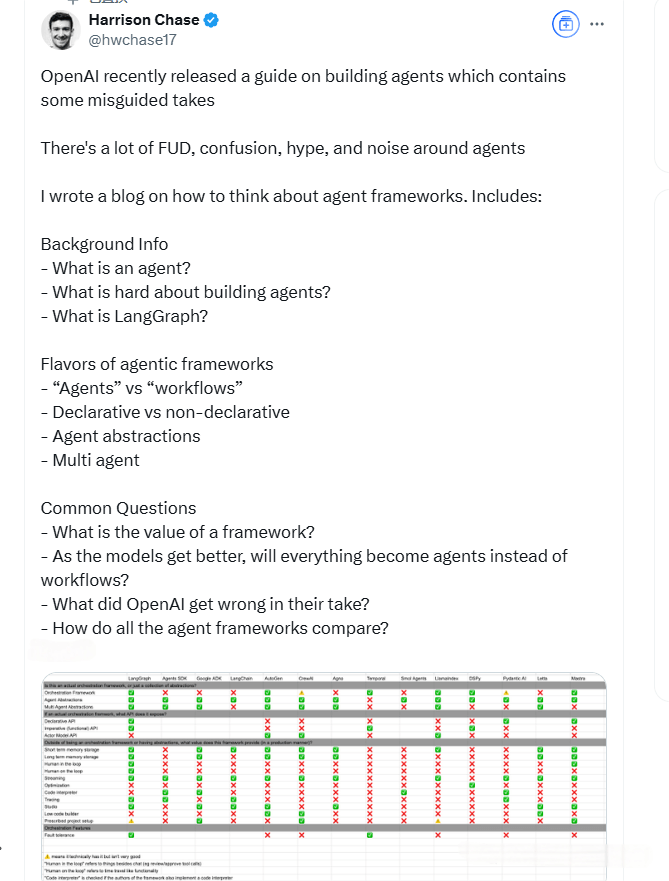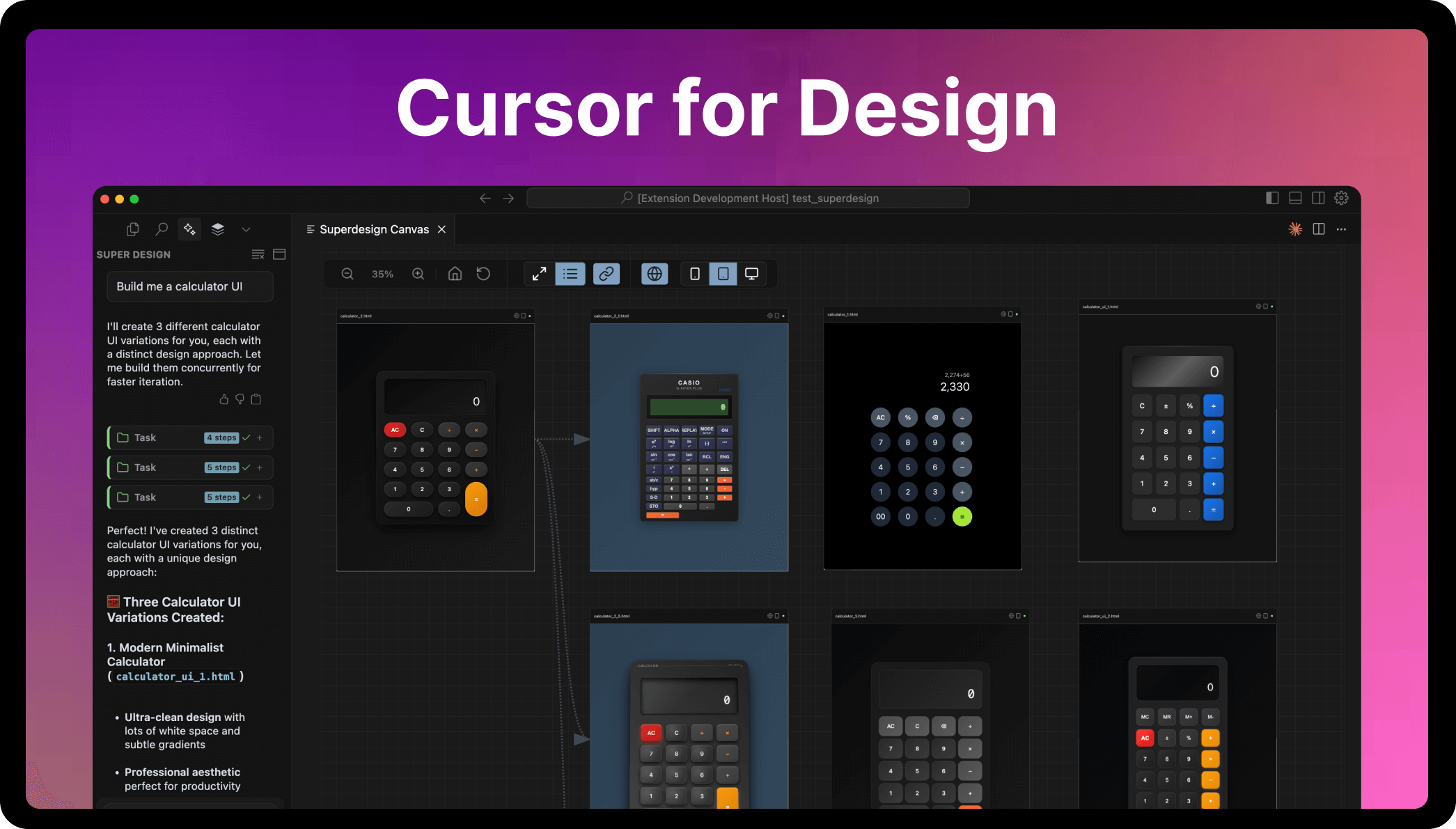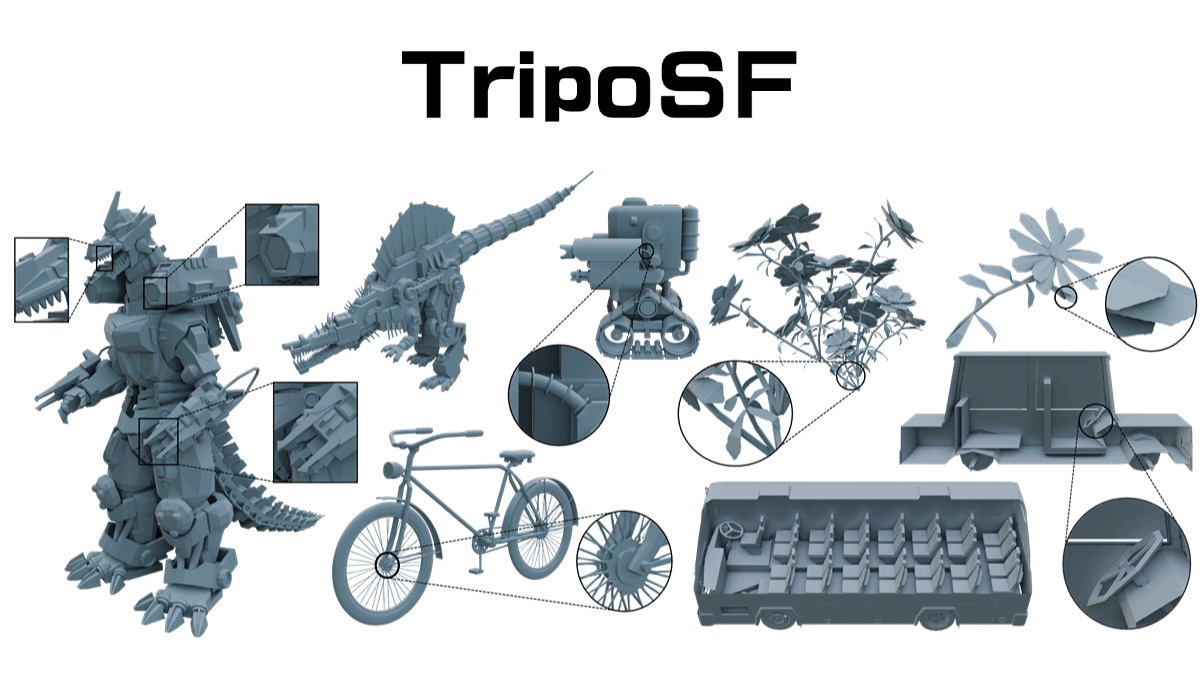Interpretation of the 2025 Global Top 50 Most Promising AI Companies List
The highly anticipated “Top 50 Most Promising AIs of 2025” list was recently unveiled. This annual ranking, jointly selected by the authoritative financial media outlet Forbes and top-tier venture capital firms Sequoia Capital and Meritech Capital, brings together the most innovative private AI companies from around the globe. It not only summarizes the achievements in the AI field over the past year but also serves as a crucial barometer for identifying future technological trends, uncovering potential investment opportunities, and discovering the “ace players” shaping the future!

New Era of AI Development: From “Articulate and Eloquent” to “Practical Actions for National Prosperity”
Different from the previous years when AI was mainly focused on perception intelligence fields such as natural language processing and image recognition, the innovation focus of AI in 2025 is undergoing a significant shift—from “being able to chat” to “being able to act.” This key trend is clearly demonstrated by the AI 50 list: startups are actively embracing AI agents and reasoning models, striving to enable AI to truly take over tasks previously requiring human effort and achieve large-scale workflow automation.
This means that in the future, AI will no longer merely be a tool that follows instructions, provides information, or generates content. Instead, it will become an intelligent assistant capable of independent thinking, autonomous decision-making, and completing complex tasks, potentially even replacing certain repetitive and process-driven roles. Rather than focusing solely on large model manufacturers like OpenAI, Anthropic, or xAI, we should pay more attention to those who skillfully leverage these advanced models to create application-layer AI tools that address real-world business challenges and enhance productivity.
The Five Key Trends Revealed by the AI 50 List:
Through in-depth analysis of the “Top 50 Most Promising AIs of 2025” list, we can clearly identify the following key trends shaping the future of AI development:
1. AI agents and workflow automation become the core driving forces: In the past, our interaction with AI mostly remained at the question-and-answer level. AI assistants could provide information, but the ultimate actions and decisions still relied on humans. However, in 2025, this situation is being completely rewritten. AI agents are on the rise. They can autonomously execute tasks and complete end-to-end workflows.
A typical example is Harvey, a legal AI startup that was selected for the AI 50 list. Its software is capable of more than just answering legal inquiries. What’s even more impressive is its ability to handle an entire legal workflow, including the rapid review of massive volumes of documents, predictive analysis for complex cases, intelligent drafting of legal documents, automatic revision of contract clauses, and even assisting with negotiations, case management, and client communication—tasks that typically require a team of junior lawyers. This marks a significant evolution of AI from being a “useful tool” to becoming a “real problem solver.”
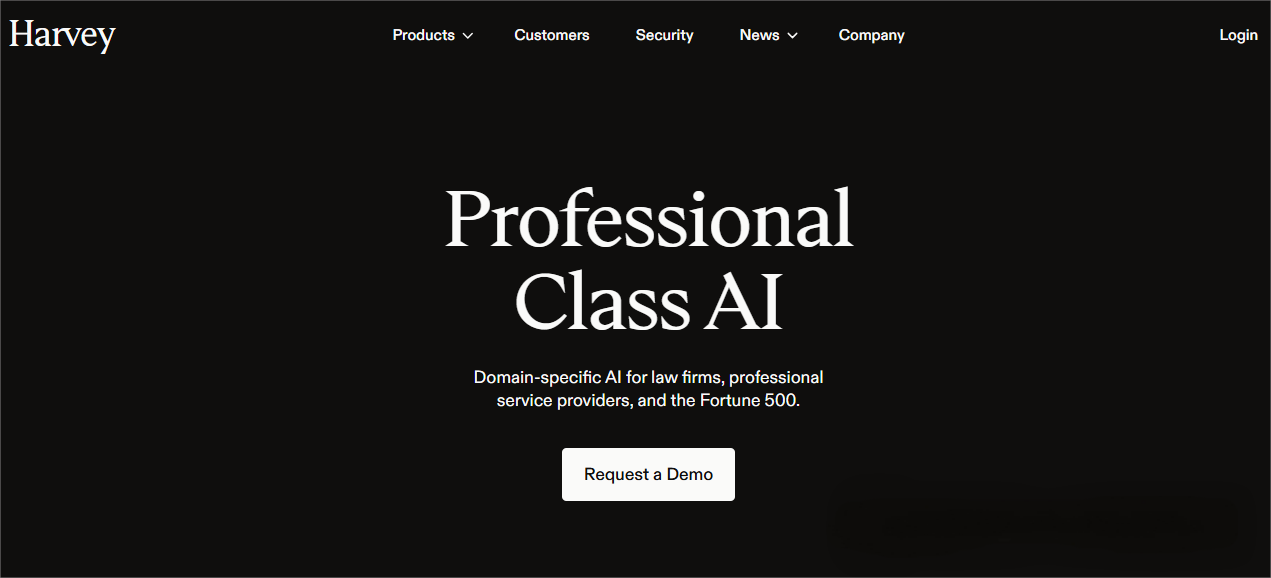
2. Breakthroughs in the Deep Integration of Robotics Technology and AI: Although large-scale commercial deployment of robots has not yet truly arrived, startups focusing on robotics technology have made remarkable progress over the past year. They have ingeniously combined powerful AI models built on Transformer architectures (the core technology of large language models like ChatGPT) with advanced hardware, endowing robots with enhanced perception, decision-making, and action capabilities.
NVIDIA CEO Jensen Huang even made a bold claim at the recent developer conference, stating that “physical AI in the industrial and robotics fields represents a $50 trillion opportunity.” Figure AI is a representative of this trend. They recently announced that their BotQ high-capacity manufacturing factory is now capable of producing 12,000 humanoid robots annually and has introduced a new General Vision-Language-Action (VLA) model called Helix. This means their robots not only possess stronger manufacturing capabilities but also have enhanced intelligent understanding and execution abilities.

Another company selected for the AI 50, Skild AI, has adopted a different strategy. Instead of manufacturing specific robotic products, they focus on developing a universal robot foundation model called Skild Brain. This model can be flexibly integrated into various types of robots. Skild AI also plans to provide services based on Skild Brain to the broader robotics industry, signaling a further enhancement in the standardization and intelligence level of robot technology in the future.

3. Consumer-grade AI productivity tools are about to explode: Currently, the main ways for ordinary consumers to access the most advanced AI are still chatbots such as OpenAI’s ChatGPT or Anthropic’s Claude, as well as some emerging conversational AI products like Grok. Although hundreds of millions of users have already experienced conversations with these AI tools, there has not yet been a truly widespread, phenomenon-level app that can represent users in completing daily complex tasks.
With the continuous maturation of AI technology and people increasingly recognizing the tremendous potential of AI in saving time and money at work, there is reason to expect a wave of AI productivity products aimed at consumers to emerge. These products will be able to truly represent users in handling various tedious tasks. For instance, Anthropic recently launched Claude Code, making software development much easier for ordinary consumers. These new capabilities indicate that the future of AI assistants capable of intelligently managing your schedule, conveniently booking travel, and end-to-end organizing your personal files is no longer far off.
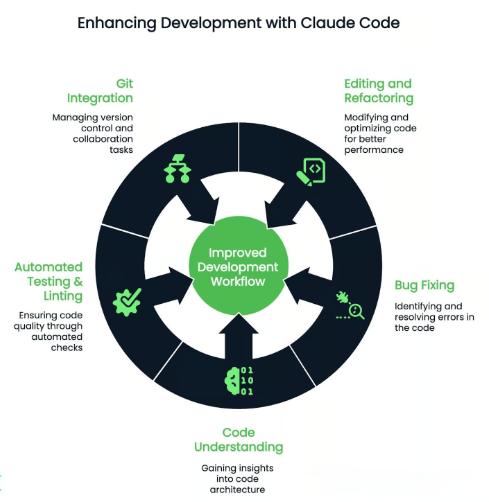
4. AI Infrastructure Becomes a Solid Backing: Training and running powerful AI models require vast amounts of computing resources and energy. This makes companies that can provide efficient and reliable AI infrastructure extremely crucial.
Crusoe Energy is a typical example. They have a unique vision and are adept at identifying underutilized energy sources in remote areas. They establish dedicated data centers to support high-density computing tasks, initially focusing on cryptocurrency mining and now concentrating on running and training AI models. More notably, Crusoe is developing one of the world’s largest data centers in Abilene, Texas, as a key contributor to the Project Stargate, a $500 billion AI infrastructure initiative jointly supported by OpenAI, SoftBank, Oracle, and MGX. (Project Stargate may have been influenced by the recent surge in popularity of DeepSeek.)

Besides Crusoe, there are also companies such as Lambda and Together AI on the list, which are also actively providing crucial cloud computing services for AI developers and enterprises. These infrastructure providers are laying a solid foundation for the booming development of AI.
5. Synchronous Development of Industry Challenges and Legal Regulations: It is worth noting that the rapid development of AI has not been smooth sailing. Some star companies on the list, including OpenAI and Anthropic, are facing an increasing number of copyright infringement lawsuits. Whether the large amounts of data used in AI model training constitute fair use remains a focal point of debate in the legal community. In addition, the accuracy, safety, and potential ethical risks of AI models also require continuous attention and regulation.
Despite the challenges, 2025 is still regarded as a significant turning point in the development of AI. AI has transcended its role as a simple “question-answering engine” in the workplace and has begun to truly function as an “action engine,” capable of taking on significant workloads and delivering tangible results. The companies on the AI50 list powerfully demonstrate this, as they are paving the way for broader AI applications. Looking ahead, we have reason to expect that the successful experiences of enterprise-level AI will gradually permeate into the daily lives of each of us.
Focus on AI 50: Stars Shine, Each Leading in Their Own Way!
The “Top 50 Most Promising AIs in 2025” list covers various sub-sectors of the AI field. Below, we will focus on introducing some noteworthy star companies and briefly explain their core businesses and innovations.
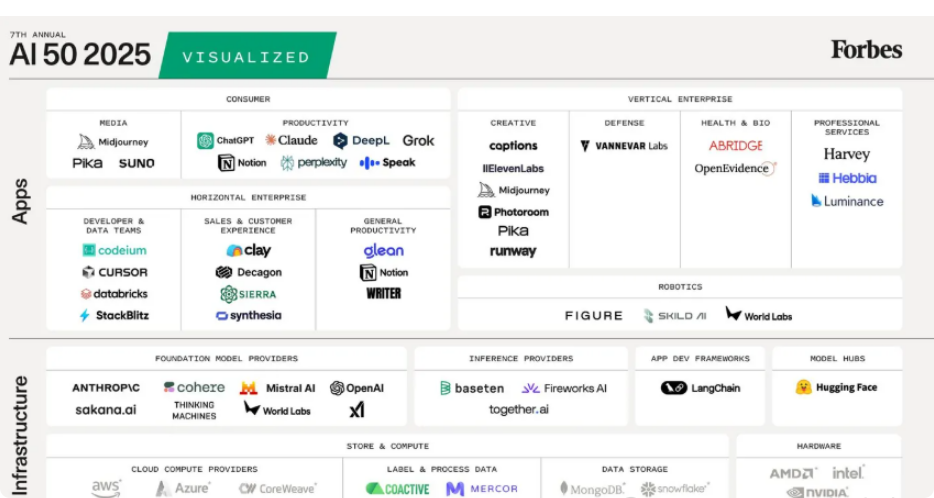
1. AI Model Giants:
1) OpenAI (USA): As the creator of ChatGPT, which sparked a global AI craze, OpenAI has recently secured $40 billion in funding led by SoftBank, valuing the company at $300 billion post-investment. OpenAI continues to lead the technological frontier of general artificial intelligence models. They consistently release more powerful and intelligent models, achieving breakthroughs in areas such as image generation and code writing. Currently, 500 million people use the ChatGPT conversational AI every week, with approximately 2 million paying enterprise users. In March 2025, this AI giant introduced advanced image generation capabilities for ChatGPT 4o, triggering a viral yet controversial trend. People created thousands of images in the style of Japanese animation studio Studio Ghibli, whose co-founder Hayao Miyazaki described AI-generated art as “an insult to life itself.” However, OpenAI also faces challenges, including controversies over its transition from a non-profit to a for-profit organization and ongoing copyright litigation.
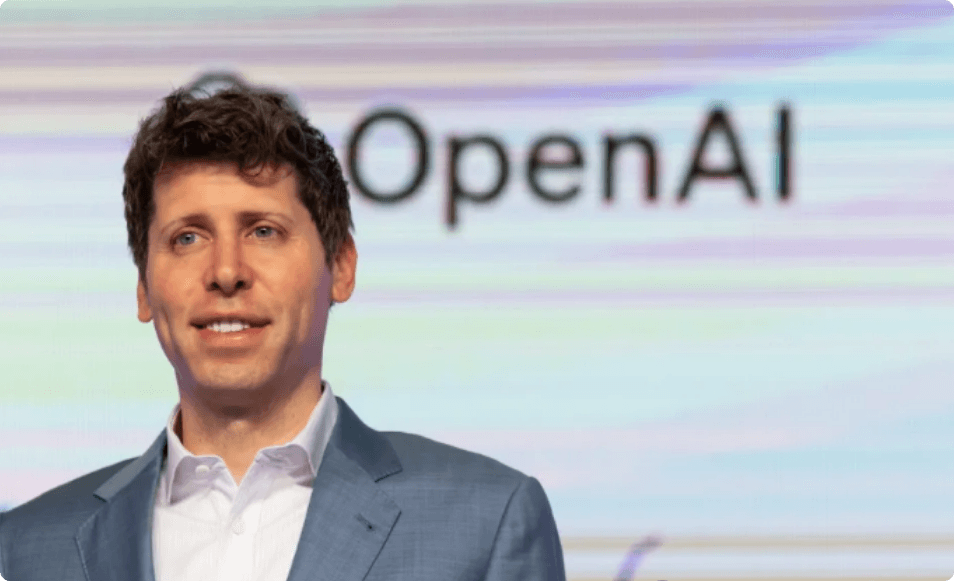
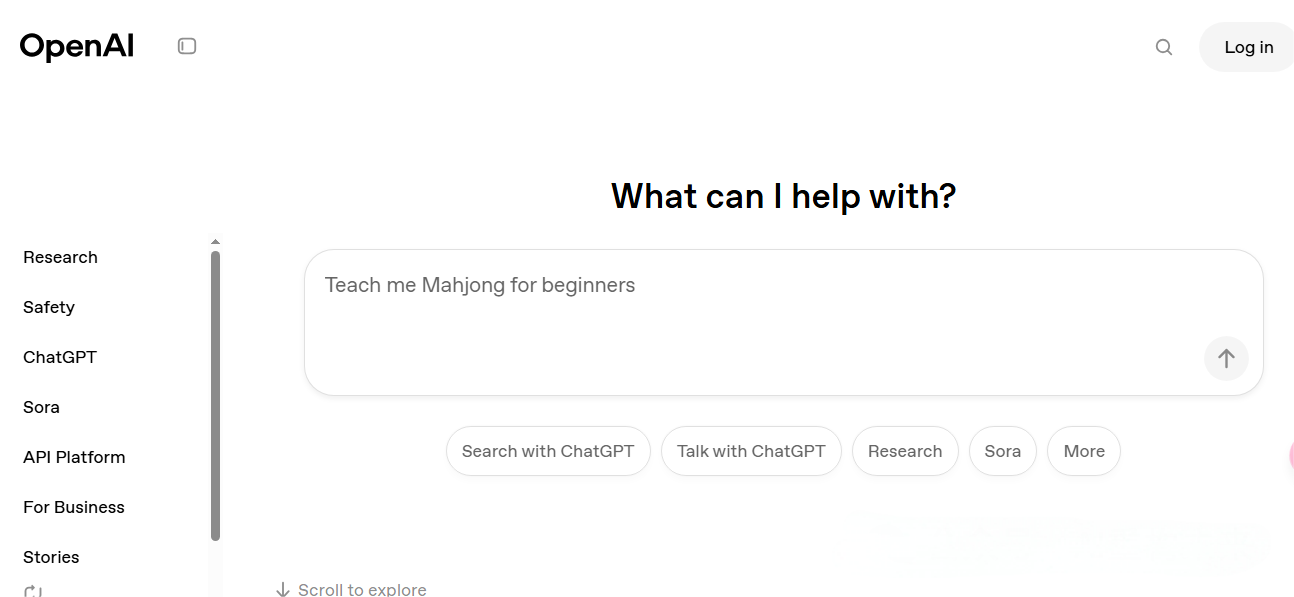

2) Anthropic (USA): Anthropic has always been regarded as the most formidable challenger to OpenAI. In 2025, they released Claude 3.7 Sonnet, a model equipped with “hybrid reasoning” capabilities that can intelligently select processing methods based on the complexity of the problem. Additionally, they introduced Claude Code, which supports a range of other software engineering functions such as searching and reading code, editing files, and running commands. Recently, Anthropic partnered with Databricks, another company on the AI 50 list, to sell AI agents (software that can autonomously perform specific tasks) to thousands of enterprise clients.

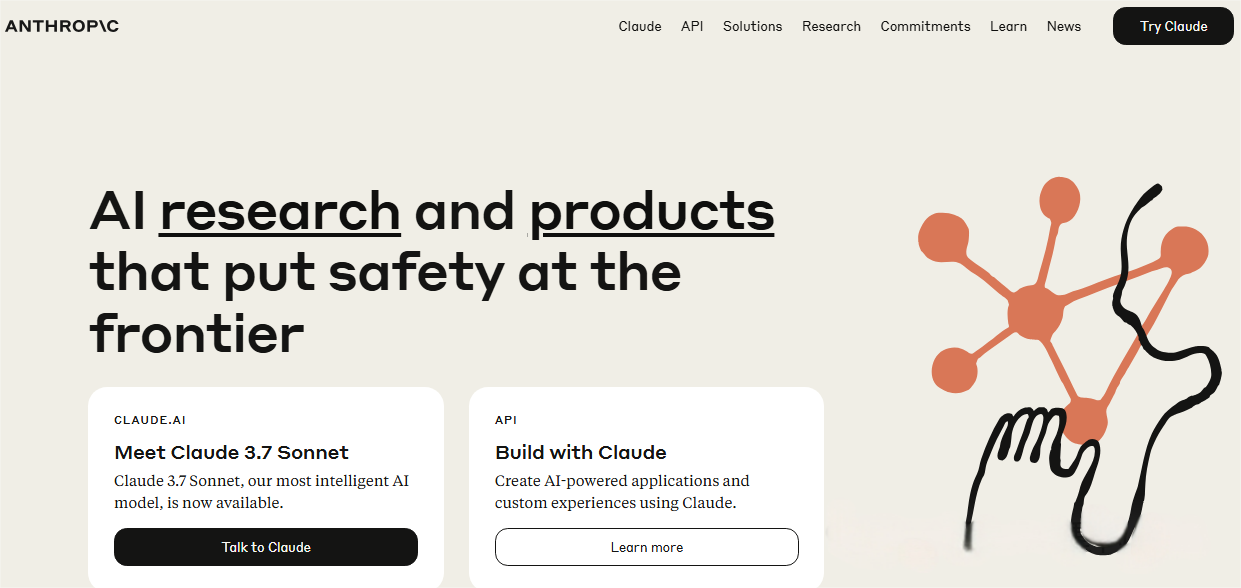
3) xAI (USA): Founded by Elon Musk, the CEO of Tesla, xAI has also attracted significant attention. Although specific details about its products remain relatively mysterious, its strong financial backing and Elon Musk’s personal influence make it a potential disruptor in the AI field. In February this year, xAI introduced the new generation AI model, Grok-3, which was trained using the Colossus supercluster equipped with 200,000 H100 GPU chips. Grok-3 represents a significant performance improvement over Grok-2, introducing innovations in reasoning capabilities and tool usage. In March, xAI completed an all-stock transaction to acquire X (formerly known as Twitter), valuing the social media platform at $33 billion. The newly merged company is valued at $80 billion.


4) Mistral AI (France): Mistral AI is a startup based in Paris, France, known as the “OpenAI of Europe.” Founded in 2023, the company focuses on developing open-source AI models. As of April 2025, Mistral AI has been valued at approximately $6.51 billion and has raised $1.1 billion in venture capital from investors including a16z, General Catalyst, Microsoft, and NVIDIA. In February, Mistral AI launched a new version of its AI assistant, Le Chat.
Mistral AI has collaborated with NVIDIA to launch the Mistral NeMo 12B, a compact language model designed for enterprise applications, which has gained significant influence in the open-source community.

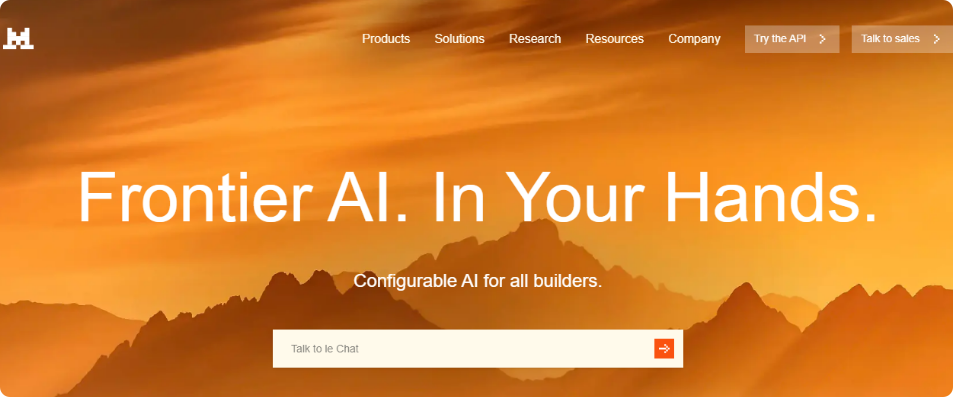
5) Sakana AI (Japan): Headquartered in Tokyo, Sakana AI was established in July 2023 by former Google researchers David Ha and Llion Jones, the latter being one of the co-authors of the seminal paper *Attention Is All You Need*. Its unique innovation lies in drawing inspiration from natural phenomena, such as evolution and natural selection, to design AI models. The company is committed to building smaller, more efficient open-source models. In 2024, they released an “AI scientist” capable of conducting experiments, research, and data analysis. This system is designed to achieve fully automated scientific discovery, capable of generating research ideas, writing code, conducting experiments, analyzing results, and even drafting complete scientific papers, including an automated peer-review process.

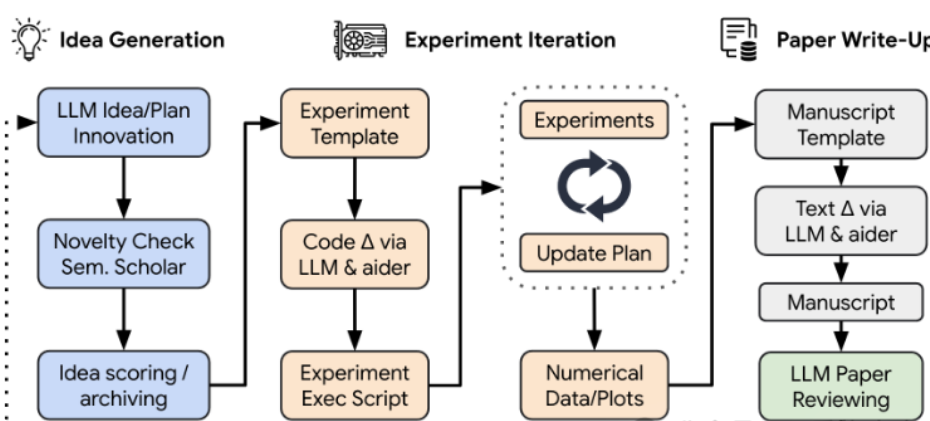
6) Cohere (Canada): Cohere focuses on creating language models for AI research and enterprise applications. Their co-founder and CEO, Aidan Gomez, is also one of the authors of the famous paper “Attention Is All You Need.” He and his co-founders, Nick Frosst and Ivan Zhang, have strong ties to Google Brain. Both Gomez and Frosst have worked under AI pioneer Geoffrey Hinton. Cohere has become a darling of the industry, receiving investments from companies like Salesforce and Nvidia, with a valuation reaching $5.5 billion.

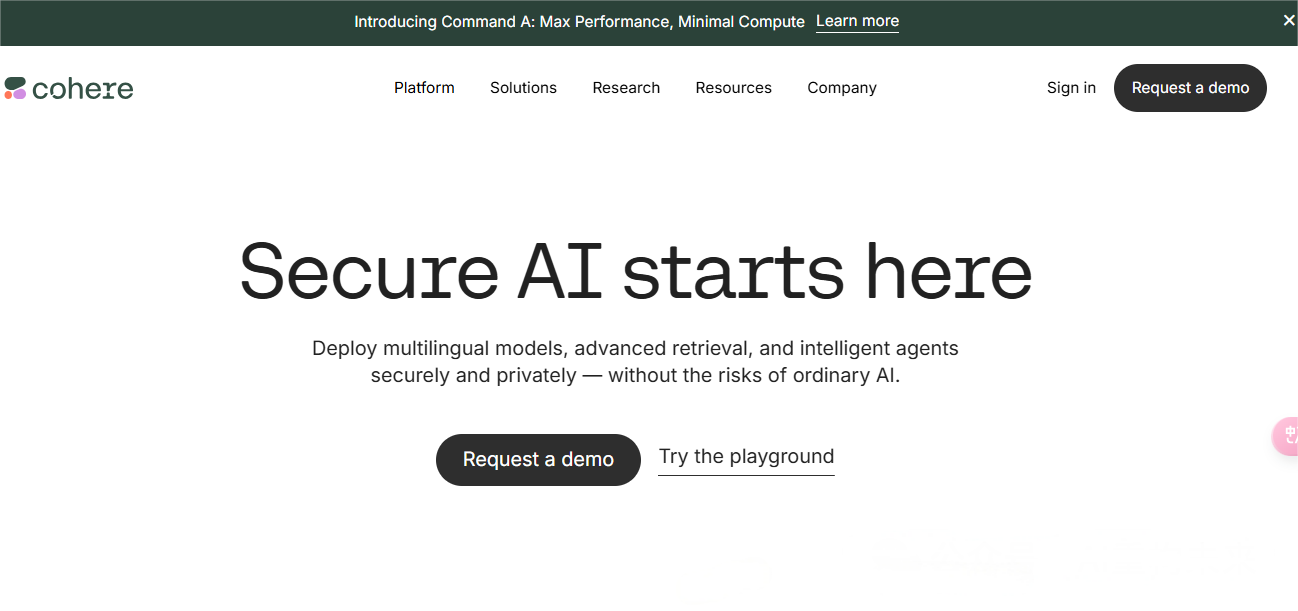
2. Industry Empowerment with AI:
1) Medical and health:
▪ Abridge (USA): Founded by Dr. Shiv Rao, a practicing cardiologist, Abridge aims to liberate clinical physicians from administrative tasks such as filling out detailed medical records after patient visits through AI technology. Their AI system can record doctor-patient conversations, automatically generate summaries, and fill out electronic health forms. It is currently being used in renowned medical institutions such as Johns Hopkins Hospital and the Mayo Clinic.


▪ OpenEvidence (USA): OpenEvidence is hailed as the “ChatGPT for doctors.” It aggregates a vast amount of medical research literature and clinical trial data, leveraging AI technology to help medical professionals quickly find answers and make more informed decisions. They have established a content partnership with The New England Journal of Medicine, further enhancing the authority of the platform’s information.


2) Legal Technology:
▪ Harvey (USA): As previously mentioned, Harvey utilizes AI to handle complex legal work processes, greatly enhancing the efficiency of the legal industry. Harvey was jointly founded in 2022 by Gabriel Pereyra (CEO) and Winston Weinberg. The two founders respectively have profound technological and legal backgrounds. In the past year, its number of clients has increased from 40 to 235, including most of the top 10 law firms in the United States. Recently, this startup has completed a Series D financing round of 300 million US dollars, with investors including Sequoia Capital and the legal giant LexisNexis, and its valuation is 3 billion US dollars.

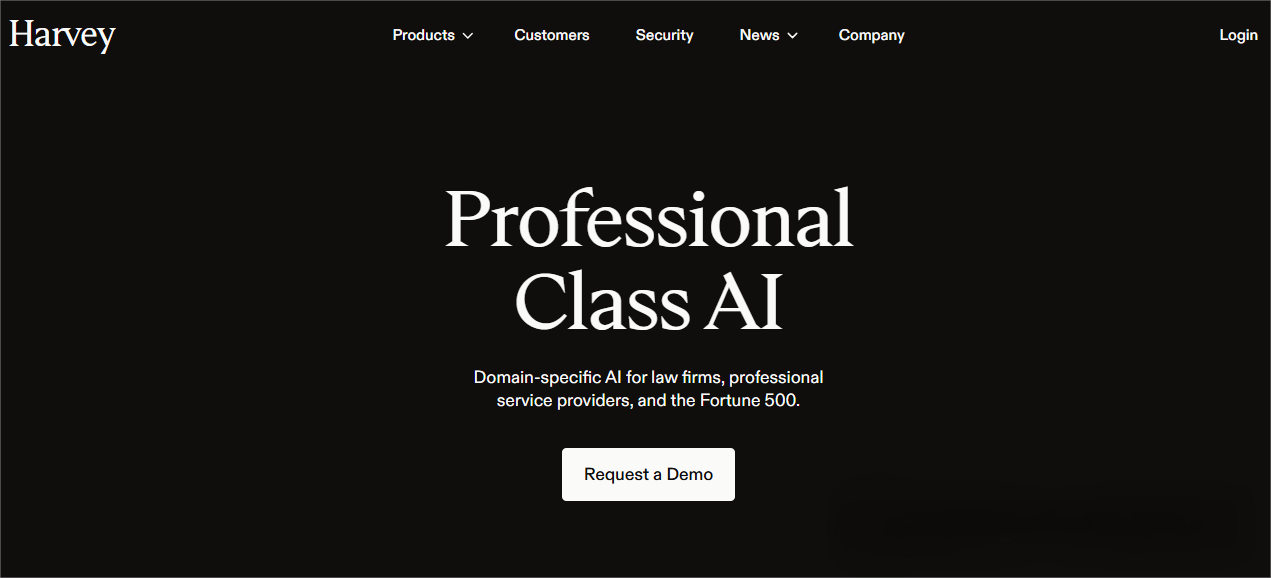
▪ Luminance (UK): Founded in 2015 by Cambridge scholars Adam Guthrie and Graham Sills, this startup focuses on using AI technology for contract generation, negotiation, and analysis. Unlike the more commonly used GPT model, the company’s proprietary Legal Pre-trained Transformer (LPT) model is specifically designed for legal work. It has been trained on over 150 million verified legal documents, many of which are not publicly available, giving Luminance a competitive edge. Their clients include well-known enterprises such as AMD, Rolls-Royce, and Lamborghini. Recently, they launched Lumi Go, a product capable of automatically representing users in contract negotiations. Headquartered in Cambridge, the company has raised a total of $165 million in funding, with its most recent Series C round securing $75 million in February.

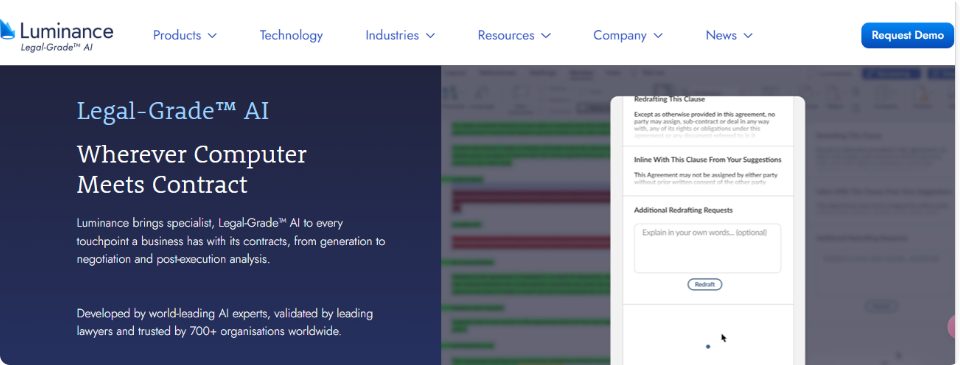
3) Software development:
▪ Anysphere (Cursor) (USA): AI coding tool Cursor is a highly popular AI coding tool and the sole product of its parent company, Anysphere. It enables engineers to edit code through daily language prompts, greatly enhancing coding efficiency. It is reported that Anysphere has signed contracts worth approximately $100 million in about one year, and this number is still growing rapidly. Cursor was founded in 2022 by 24-year-old Michael Truell and three of his classmates from the Massachusetts Institute of Technology. It helps engineers from companies such as Instacart and Samsung edit code using non-technical prompts in daily language. These prompts can be something like “Let me make an 8-bit side-scrolling video game” or “Build a weather application for me”. They have already competed with giants such as Github Copilot in the global automatic coding market.

Co-founders: Sualeh Asif, Arvid Lunnemark, Aman Sanger, Micheal Truell
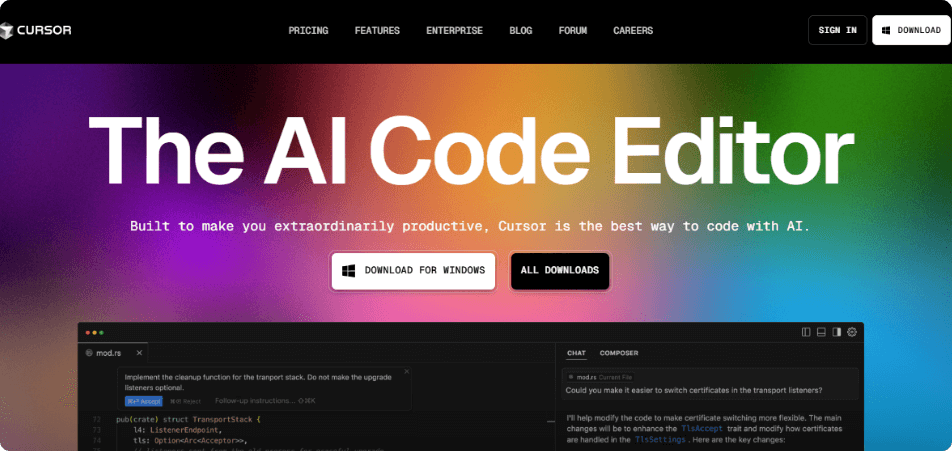
▪ Windsurf (USA): Windsurf (formerly known as Codeium) is also an AI-driven coding tool designed to improve the efficiency of software development, supporting more than 70 programming languages. This service is part of CEO Varun Mohan’s goal to enable software developers to work faster and more efficiently. The company has launched a new product called “Windsurf Editor”, which helps programmers work with AI software, track and approve its suggestions. Driven by companies such as Zillow and Anduril, this startup has received $243 million in funding from investors such as Kleiner Perkins, Greenoaks, and General Catalyst, and has a valuation of $1.25 billion.

Chief Executive Officer Varun Mohan

4) Customer service:
▪ Decagon (USA): Decagon has developed AI customer service robots aimed at providing corporate clients with a more personalized and efficient customer service experience. Their AI robots can even simulate human emotions to better understand and respond to users. Jesse Zhang, the co-founder and CEO of Decagon, believes that “AI agents can be 10 times more effective than human employees.” This startup serves corporate clients, including publicly-listed companies such as Duolingo and Hertz, as well as popular startups like Notion and Rippling. Their AI can assist consumers with product returns, subscription cancellations, or ordering replacement credit cards.

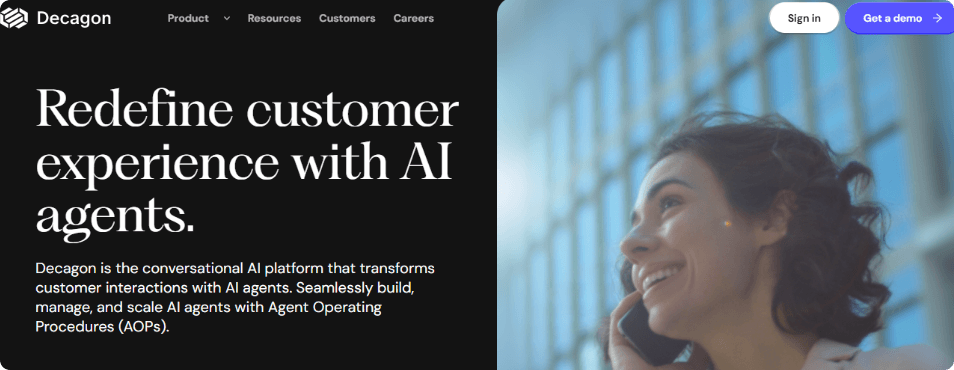
▪ Sierra (USA): Founded by Bret Taylor, the former CTO of Facebook, Co-CEO of Salesforce and Chairman of Twitter, and Clay Bavor, a senior Google veteran, Sierra focuses on transforming customer service with conversational AI agents. Their robots have been adopted by companies such as Sonos and SiriusXM. It has also helped Taylor and Bavor raise $285 million from top venture capital firms Benchmark and Sequoia, reaching a valuation of $4.5 billion in October 2024.

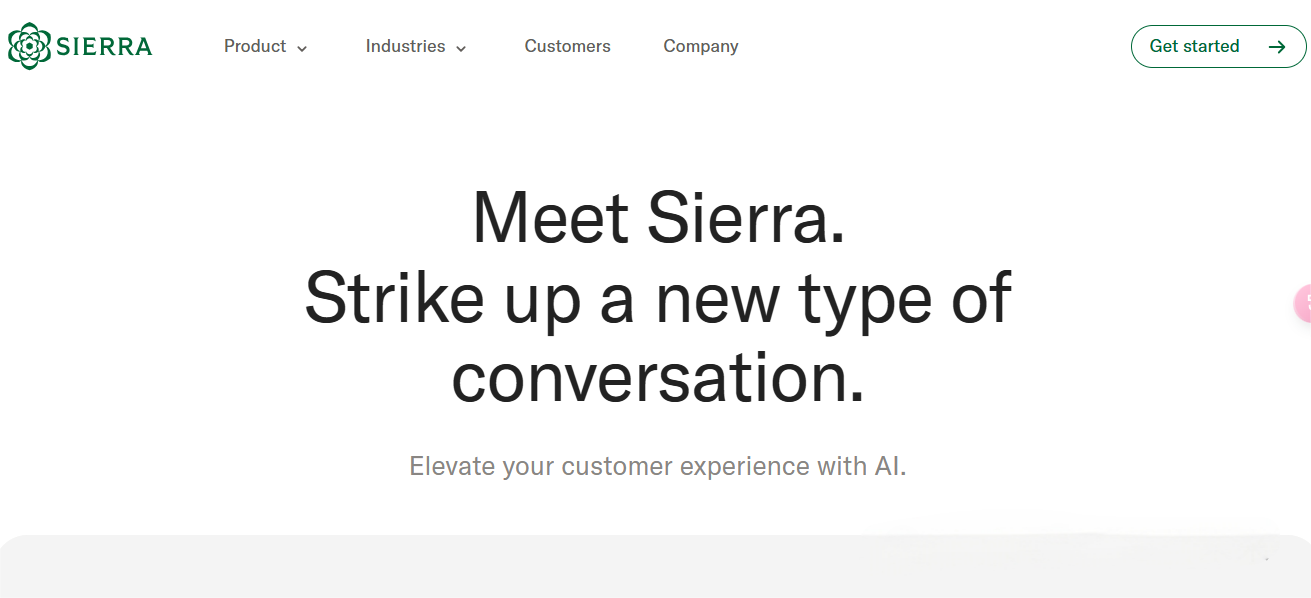
5) AI Search:
▪ Perplexity (USA): Perplexity was jointly founded by Aravind Srinivas, Denis Yarats, Johnny Ho, and Andy Konwinski in 2022. Srinivas, the CEO of Perplexity, previously worked at OpenAI, where he researched language and GenAI models such as Stable Diffusion and DALL-E 3. Perplexity focuses on developing intelligent search and information retrieval systems, leveraging advanced natural language processing technologies to help users find the information they need faster and more accurately. Perplexity has raised a total of approximately $900 million in funding from companies such as SoftBank and NVIDIA, with a valuation of $9 billion. In March this year, CEO Srinivas claimed that its annualized revenue had exceeded $100 million.
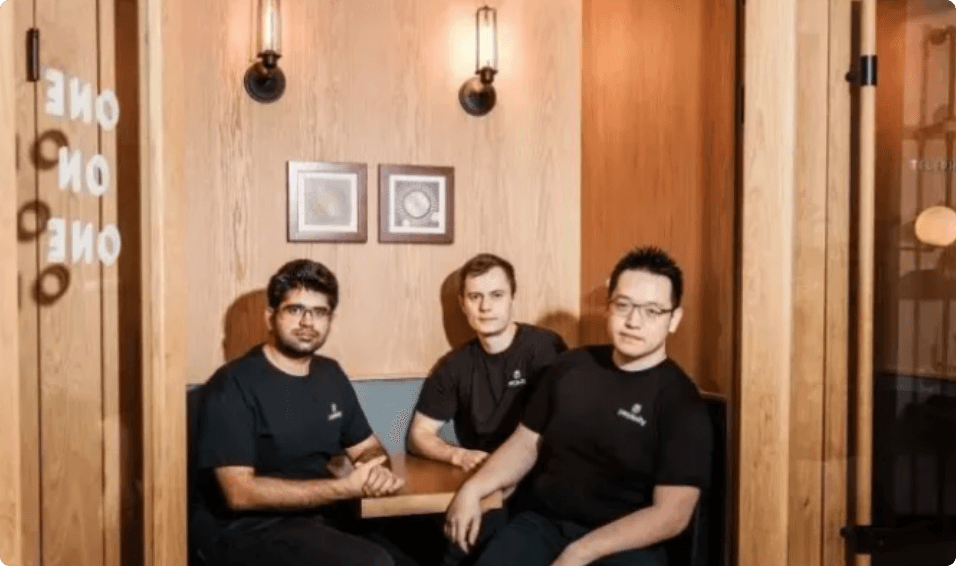

▪ Glean (USA): Founded in 2019 by former Google search engineer Arvind Jain. Glean is like an internal ChatGPT for enterprises. It can search various types of data within a company to help employees quickly find the information they need, such as remaining vacation days and employee benefits. Its AI agents can be integrated into commonly used office tools like Slack, Teams, and Zendesk, and are deeply loved by employees of companies such as Zillow, Grammarly, and Duolingo. Last year, the company raised $26 billion in its Series E financing round at a valuation of $4.6 billion. In February this year, Glean claimed that its annualized revenue was $100 million.

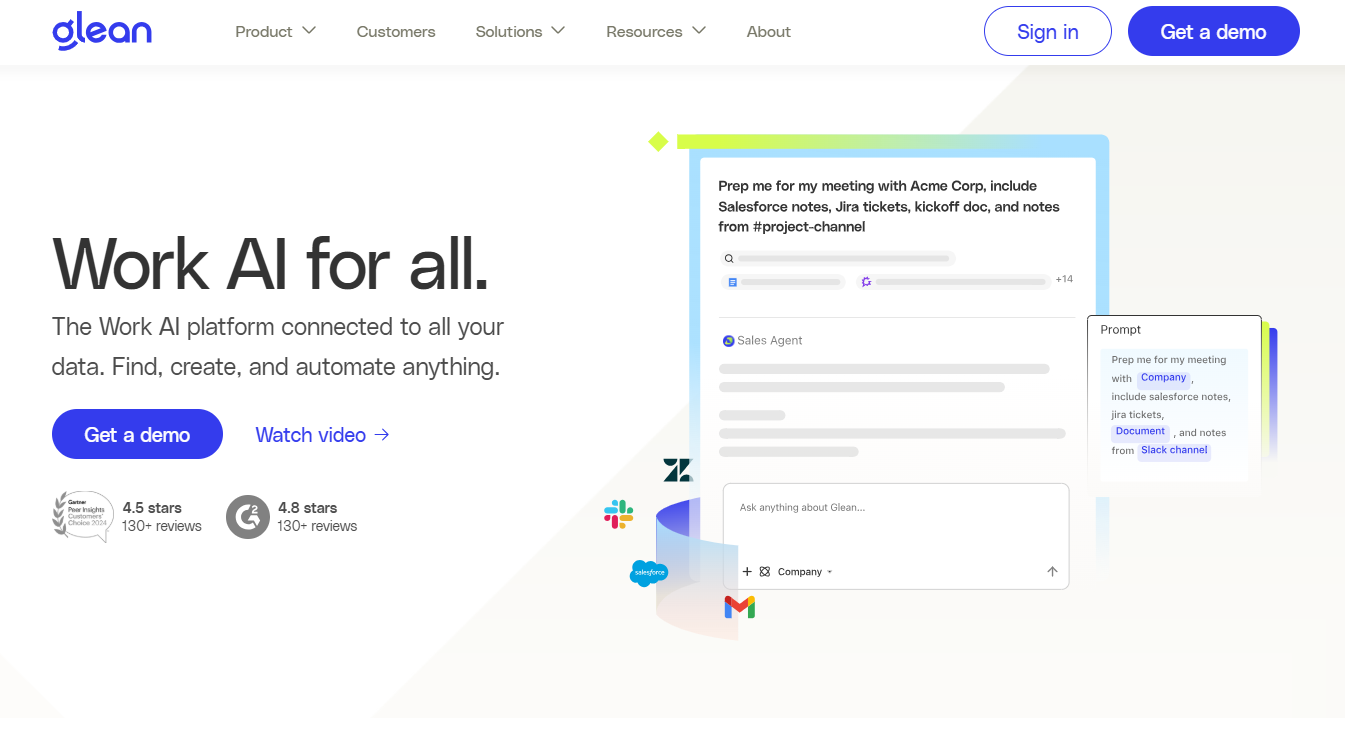
6) General AI for Finance and Law
▪ Hebbia (USA): Founded in 2020 by George Sivulka, a Ph.D. student at Stanford University, Hebbia is headquartered in New York. Hebbia provides general artificial intelligence solutions applied in the financial and legal fields, enabling lawyers, financial advisors, and others to upload millions of pages of public and private documents and then query all this information for analysis and insights. After a $130 million Series B funding round led by Andreessen Horowitz last year, the company is now valued at $700 million.

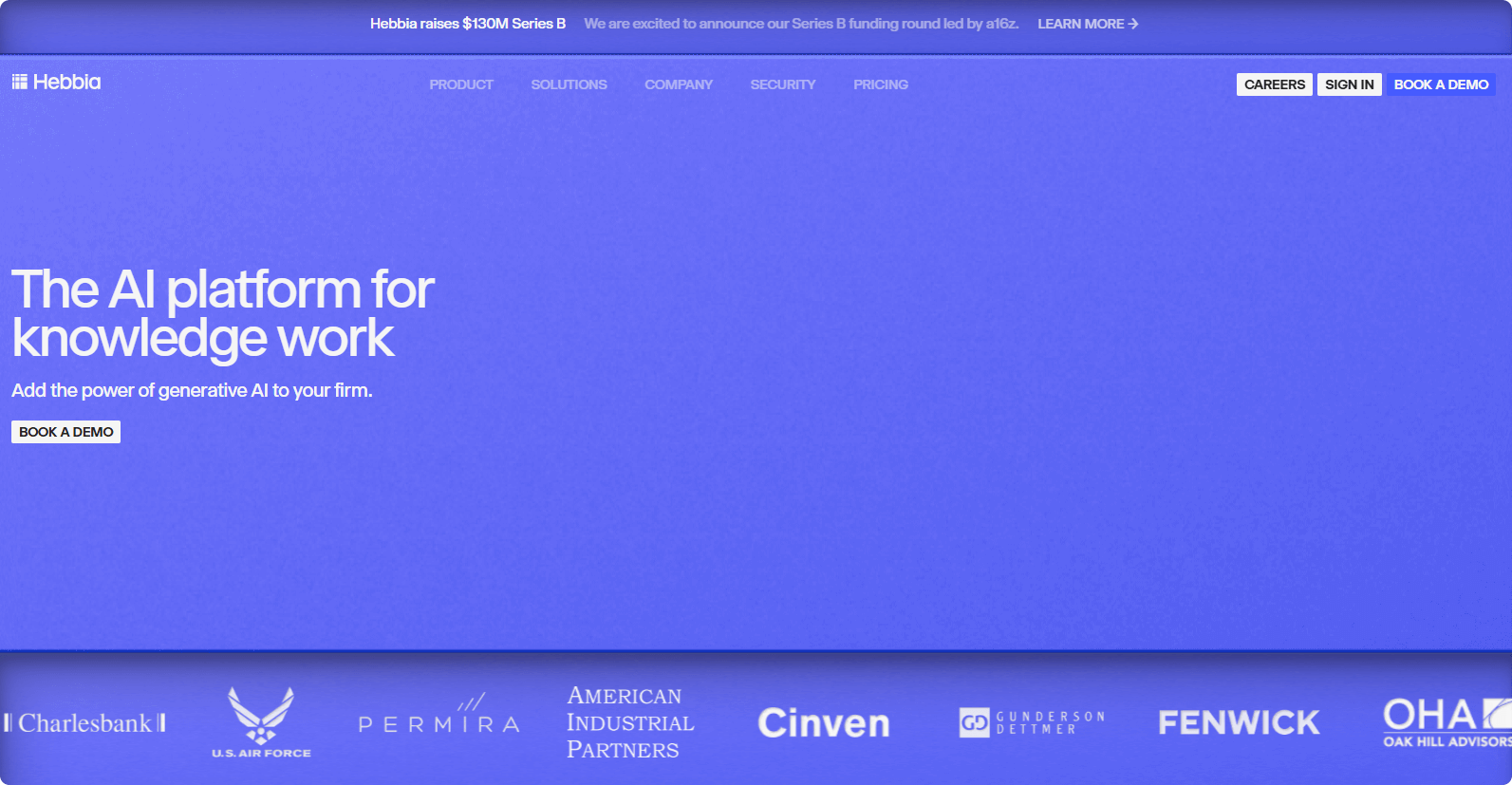
3. AI Infrastructure and Development Tools:
1) AI cloud service provider
▪ Lambda (USA): Lambda provides GPU cloud services for AI developers. Lambda was founded in 2012 by twin brothers Stephen Balaban and Michael Balaban. Initially, they launched an AI photo editing application. However, when their application incurred tens of thousands of dollars in computing fees from the cloud provider Amazon Web Services, they began building their own graphics processing unit (GPU) clusters and selling them to other companies. With the boom in AI, the demand for the hardware and cloud computing services of this California-based company, headquartered in San Jose, has soared. This $2.5 billion unicorn has become a top GPU cloud for developers at organizations such as Intel, Microsoft, and the Department of Defense, enabling them to build, test, and deploy AI products on a large scale. Lambda has 15,000 paying customers and has raised more than $863 million in funding to date. The most recent was a $480 million Series D funding round co-led by Andra Capital and SGW in February 2025.

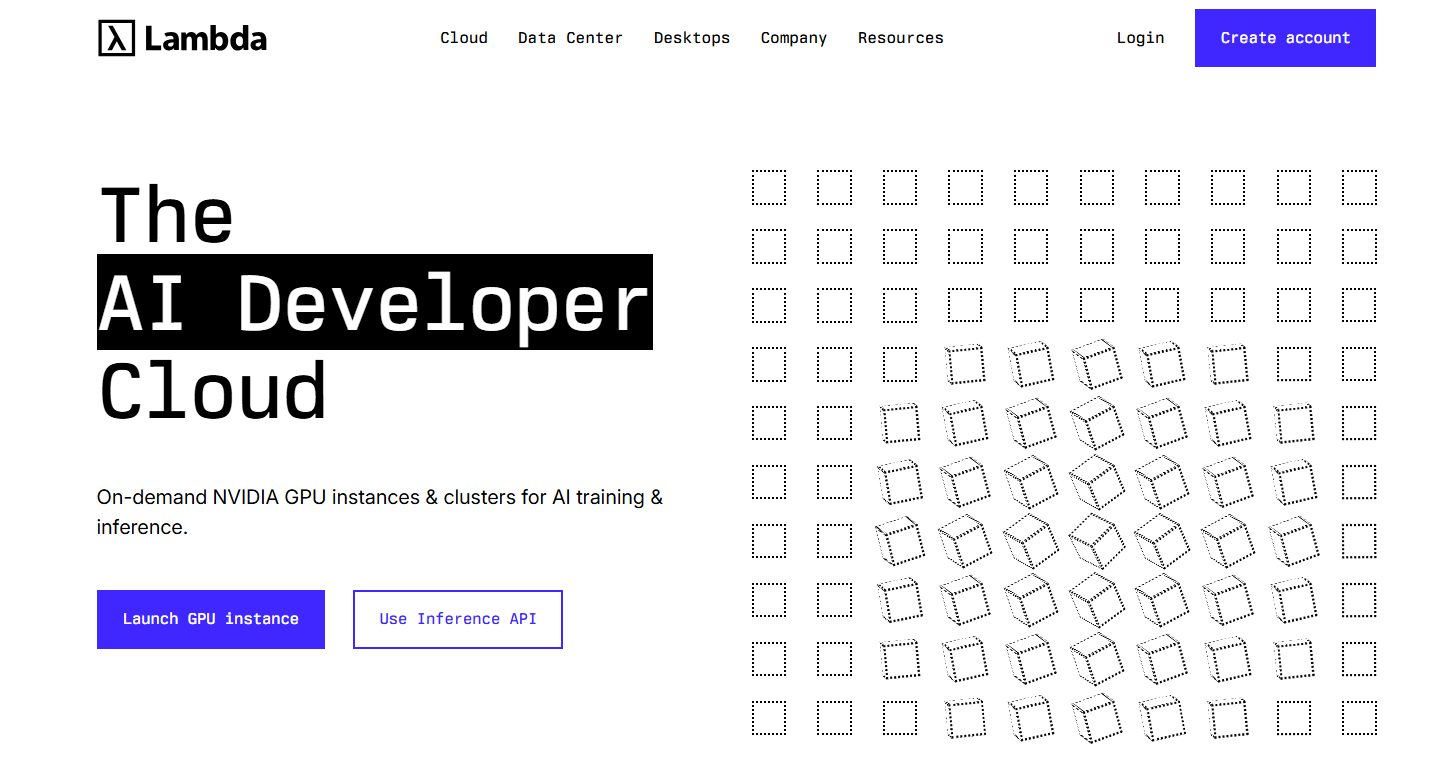
▪ Together AI (USA): Founded in 2022, Together.ai was established by Vipul Ved Prakash, a senior director at Apple; Ce Zhang, an associate professor of computer science at ETH Zurich; Chris Re, who has founded multiple startups; and Percy Liang, a professor of computer science at Stanford University. Its headquarters is located in San Francisco. Together AI provides cloud computing services and software for 500,000 AI developers as well as enterprises such as Zoom and Quora to train, fine-tune, and run AI models. The company also actively advocates for open-source AI technology and hosts 200 open-source models for video, image, and text generation. Since its inception, it has become one of the largest open-source data resources for training large language models. Its RedPajama-V2 dataset is one of the world’s largest open-source datasets for training language models. After completing a $305 million financing round led by General Catalyst in February, the company has achieved a valuation of $3.3 billion.

▪ Baseten (USA): As the AI wave matures, “inference,” the act of running AI models and allowing them to “think” and reason like humans, has become more important than simply shoveling data into models for “training.” Founded in 2019 by Tuhin Srivastava and others, Baseten focuses on the deployment of AI applications. Through optimized cloud computing technology, they have significantly reduced the inference costs of AI models while enhancing performance. In February, Baseten secured $75 million in funding, valuing the company at $850 million.
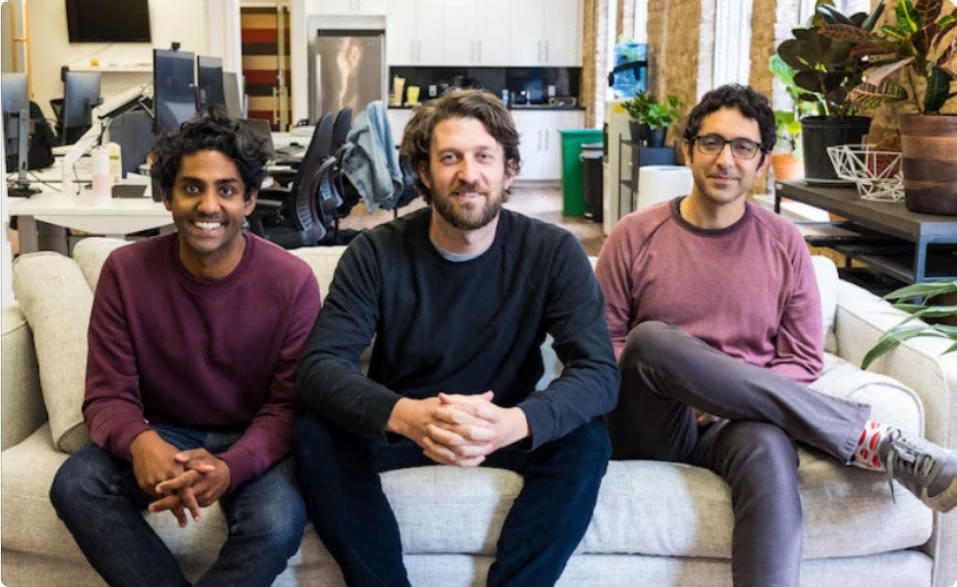
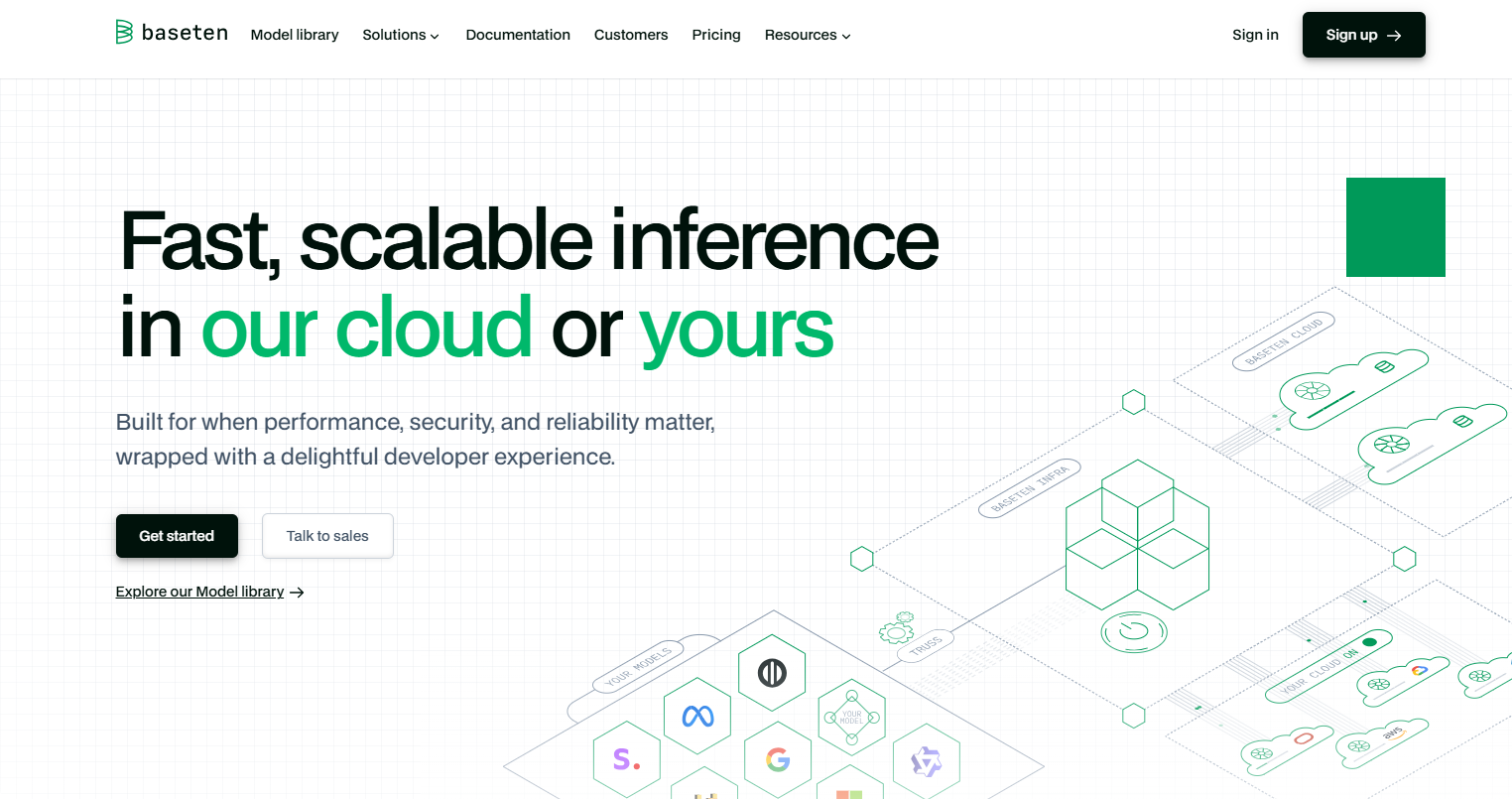
2) Data Annotation and Management:
▪ Scale AI (USA): Founded in 2016 by Chinese-American prodigy Alexandr Wang and others. Initially, Scale AI focused on providing data annotation services for autonomous vehicles. Nearly a decade later, it has collaborated with clients such as Meta, Microsoft, and OpenAI to label training data for their models and build infrastructure. After completing a $1 billion Series F financing round supported by Accel, Amazon, Meta, and others, the company was valued at $13.8 billion in May last year.

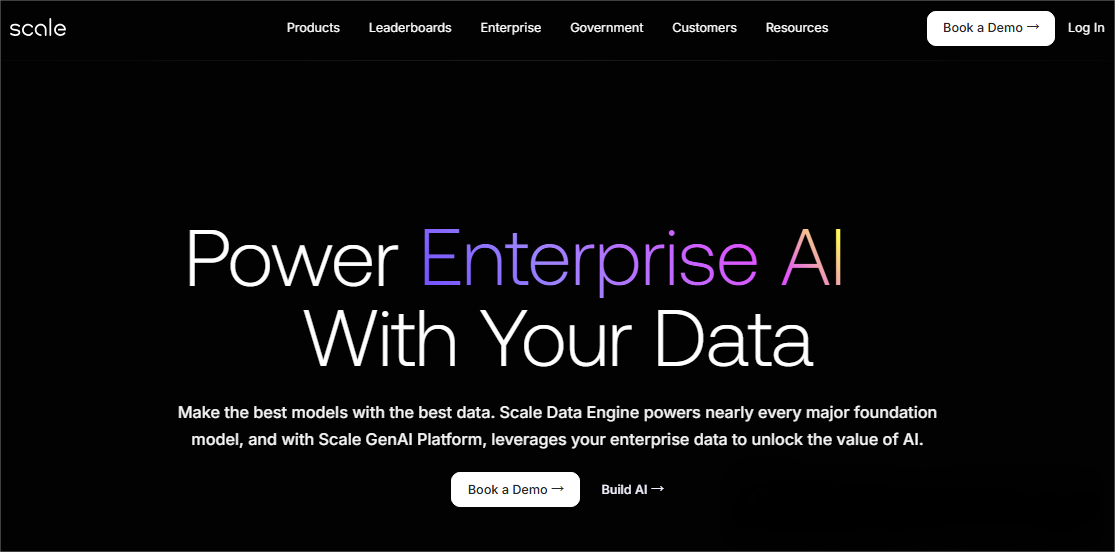
▪ Coactive AI (USA): Founded in 2021 by Cody Coleman, a computer science alumnus from Stanford University and the Massachusetts Institute of Technology, Coactive AI offers applications such as intelligent search and video analysis. By transforming the traditional Tag, Load, Search (TLS) process into Load, Search, Tag (LST), Coactive eliminates the need for metadata or tags, simplifying the way enterprises search and index visual content. This advancement is expected to change how companies utilize visual data, providing a scalable and secure multimodal AI platform that simplifies the creation of intelligent applications. Coactive AI has raised $44 million in funding, reaching a valuation of $200 million after completing its Series B financing in May 2024.

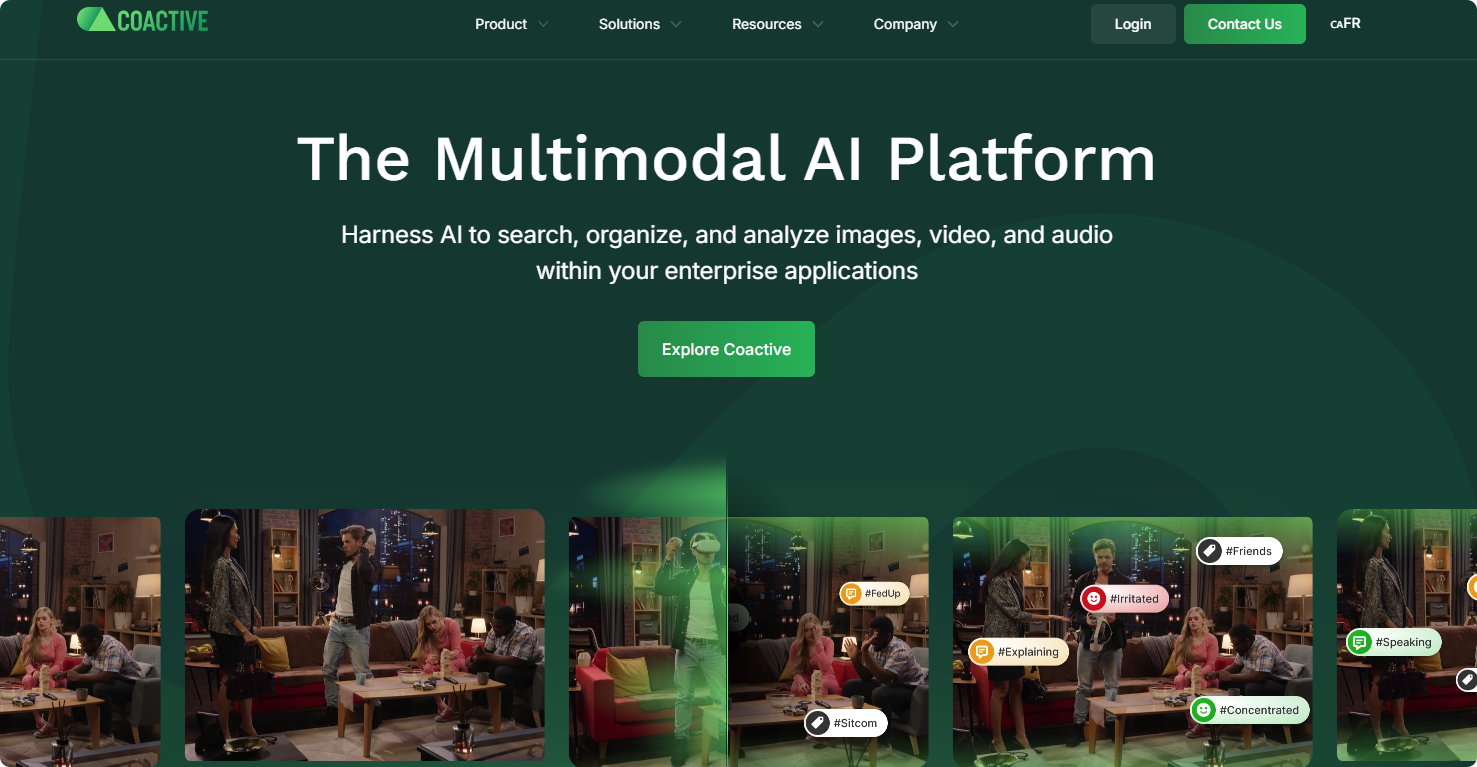
▪ Snorkel AI (USA): Founded in 2019 in the artificial intelligence laboratory of Stanford University, Snorkel AI provides software products to help enterprises annotate, fine-tune, and label their data. It is widely used by large enterprises such as Google and Wayfair. The company raised $85 million in its Series C financing round in 2021, with a valuation exceeding $1 billion, bringing its total investment to over $135 million. In October 2024, the company added a host of new features to Snorkel Flow, one of its flagship products, including tools for assessing the performance of LLMs on PDFs and extracting information from PDFs more easily.
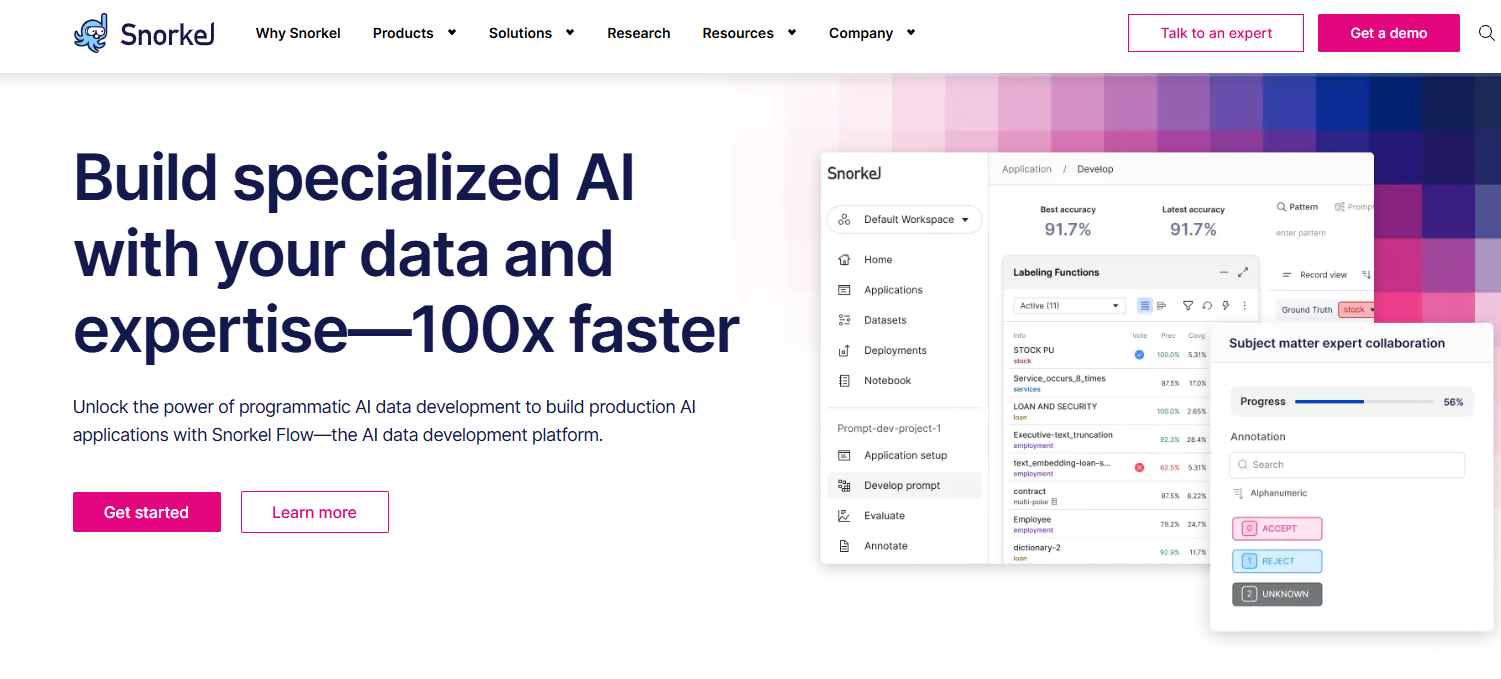
3) Open-source AI Platforms and Tools:
▪ Hugging Face (USA): Founded in 2016 and headquartered in New York, Hugging Face was established by French entrepreneur Clément Delangue, Julien Chaumond, and Thomas Wolf. Initially, it was a company developing chatbot applications for teenagers. After open-sourcing the model behind the chatbot, the company shifted its focus to become a machine learning platform and open-source model library company. Today, it has grown into a $4.5 billion open-source platform with 5 million users who can share code, collaborate on model development, datasets, and applications on the platform. The platform hosts a library of models and datasets from 215,000 companies, including Meta, Microsoft, and Uber, as well as government organizations such as the French Ministry of Culture, the Polish Ministry of Digital Affairs, and UNESCO. The company has raised a total of $395.2 million in funding from tech giants such as Amazon, Google, and NVIDIA. Recently, it launched HuggingSnap, an iPhone application that works offline and uses AI to describe what the user’s phone camera is viewing.

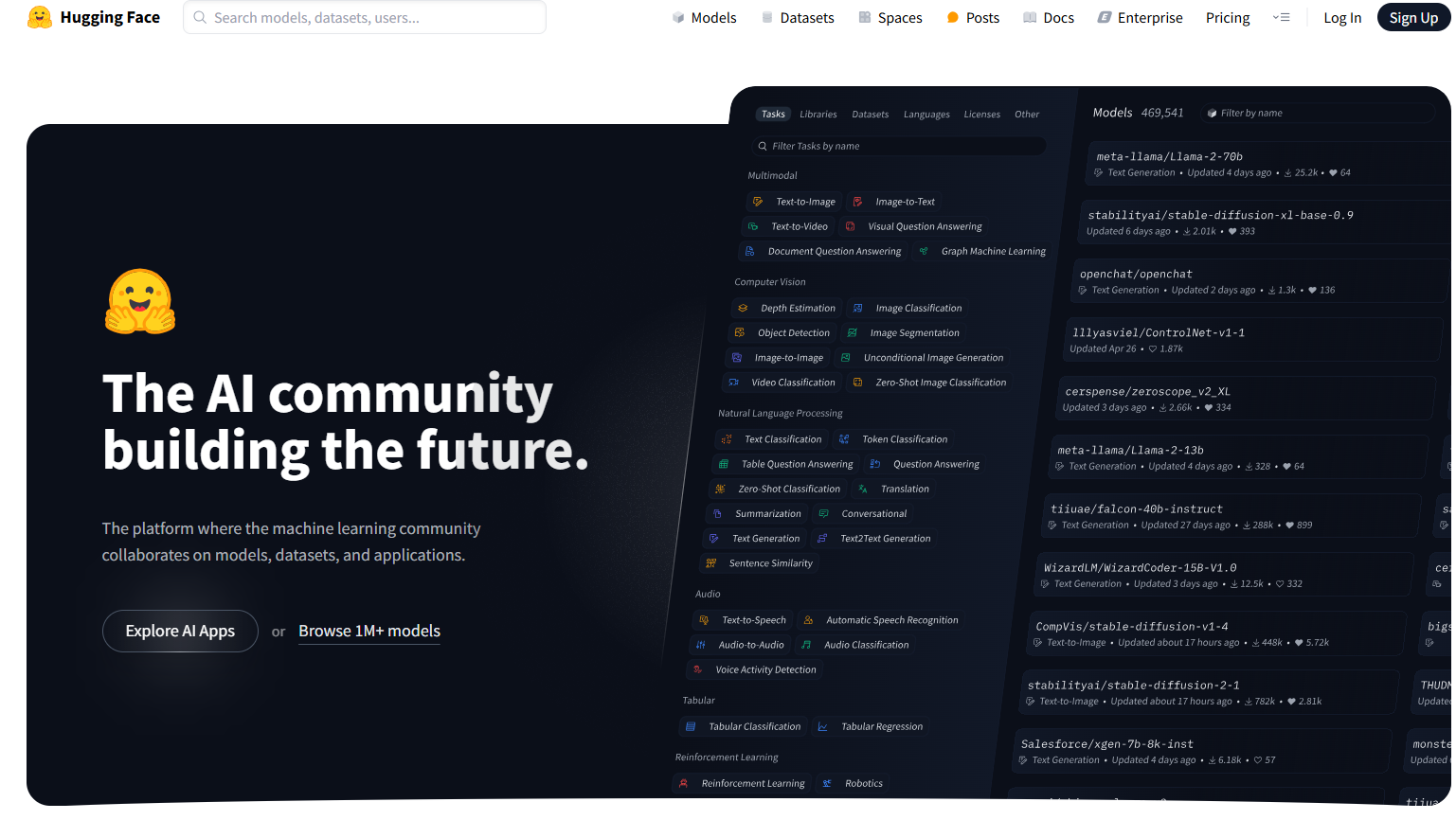
▪ LangChain (USA): LangChain is a startup founded by Harrison Chase and Ankush Gola in 2023, headquartered in San Francisco. It aims to simplify the process of building applications based on large language models (such as OpenAI’s GPT – 4). Developers can quickly build various AI applications with a small amount of code. This startup has also launched LangSmith, which is used by developers from more than 40,000 teams to evaluate, monitor, and debug underlying LLMs. Teams from Uber, LinkedIn, and GitLab use its LangGraph tool to build “AI agents”, namely systems that autonomously perform specific tasks. It has raised a total of 35 million US dollars from large investors such as Benchmark and Sequoia Capital. LangChain is valued at 200 million US dollars, and its customers include companies such as ByteDance (the parent company of TikTok), Google, Home Depot, Rakuten, and Klarna.

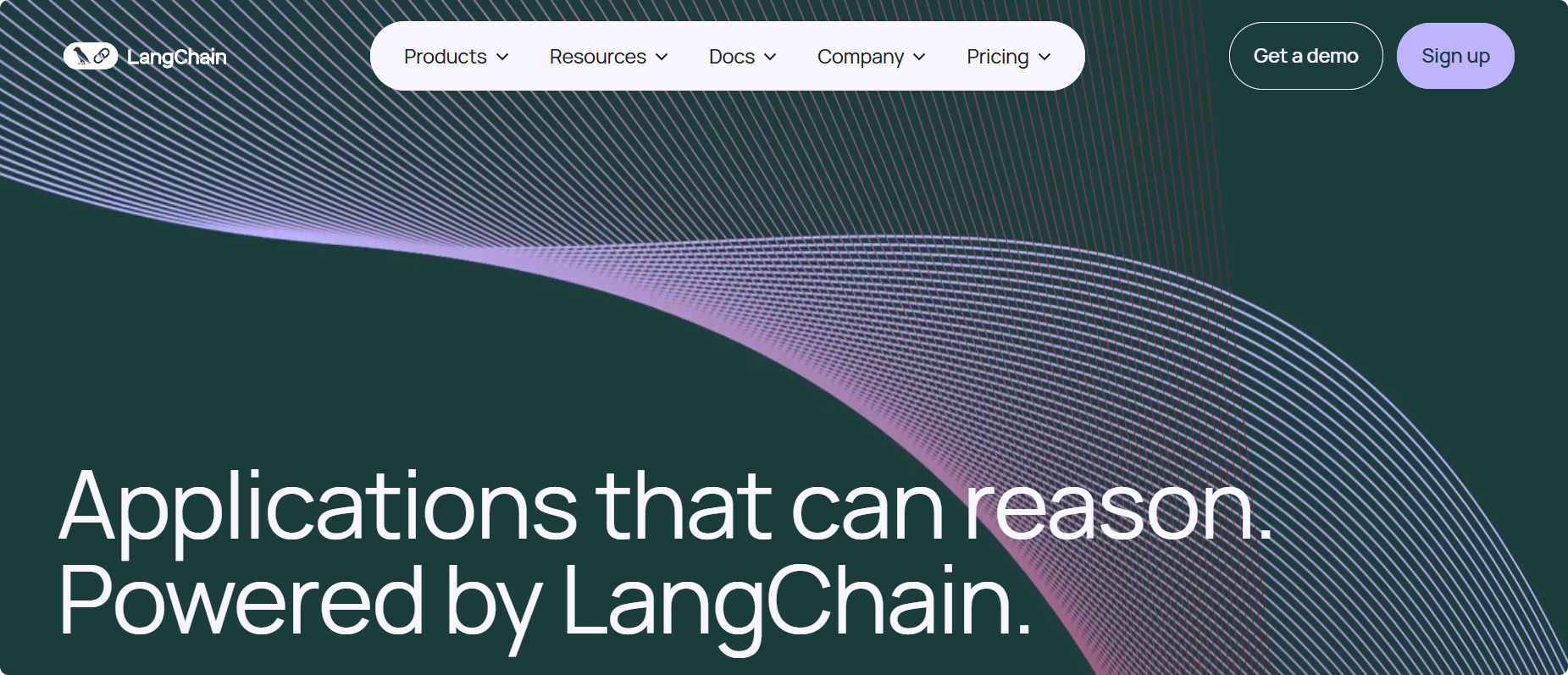
4. Generative AI Applications:
1)Video and Image Generation
▪ Midjourney (USA): It is a highly popular AI image generation tool. Users can create realistic images through text prompts. This tool can be accessed via Discord and a web application. Its CEO, David Holz, is a former NASA researcher who previously founded Leap Motion. He established this company in San Francisco in 2021. Midjourney has been used to create images ranging from floral typography and watercolor-style art to realistic portraits of Pope Francis and US President Donald Trump. Amidst the competition among other AI companies that have raised billions of dollars from investors, Midjourney is an outlier: this reclusive company has so far avoided any external funding.


▪ Runway (USA): Founded in 2018 by Cristóbal Valenzuela, Anastasis Germanidis, and Alejandro Matamala, Runway is headquartered in New York. Runway’s AI-powered image and video tools enable users to create images and videos instantly. Its models allow clients to explore an unlimited number of variations – from location changes and lighting adjustments to character re-casting, finding wide applications in the creative industry. Their Gen-4 model has made significant progress in the field of video generation. This startup has raised a total of $545 million in funding from investors such as Google, Nvidia, and Salesforce Ventures, with a valuation exceeding $3 billion.
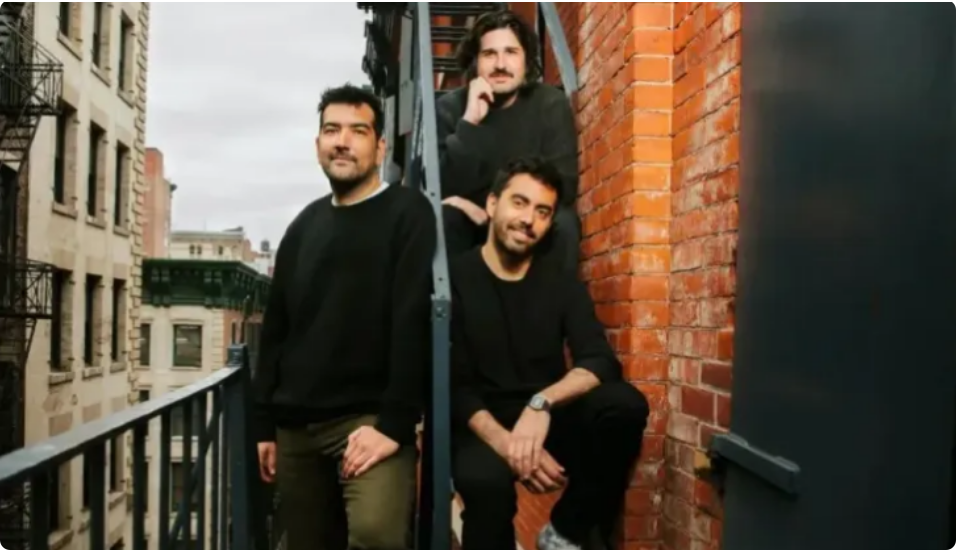
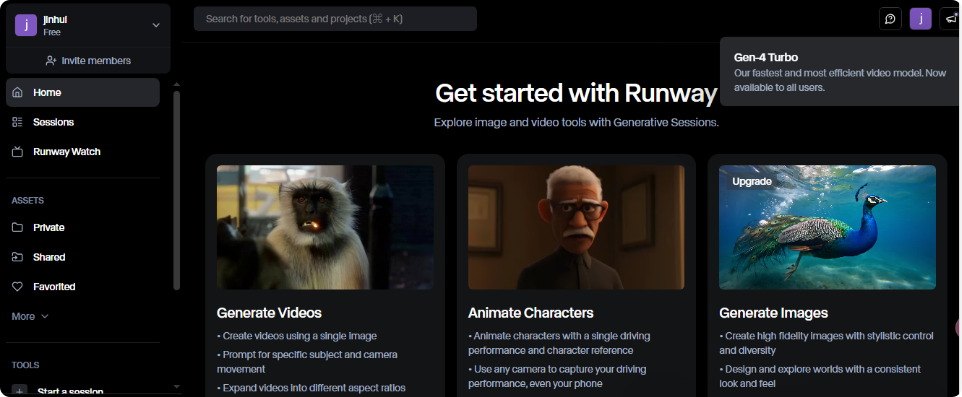
▪ Pika (USA): Pika is an AI company focusing on video generation, continuously launching new AI video tools. By providing AI-driven tools and platforms, it helps users quickly generate high-quality videos from text, images, or existing videos. The company was founded in 2018 by Demi Guo (Guo Wenjing) and Chenlin Meng, both Chinese entrepreneurs from Stanford University. Since its establishment, this startup has raised a total of $135 million in funding at a valuation of $470 million, with support from angel investors such as Nat Friedman, former CEO of GitHub, and Adam D’Angelo, co-founder and CEO of Quora.


▪ Captions (US): Founded by Gaurav Misra and Dwight Churchill in 2021, Captions enables brands to create realistic human avatars, known as “AI Brand Avatars,” for rapidly generating advertisements and social media posts, complete with AI-generated voiceovers based on provided scripts. This concept has attracted heavyweight investors including Kleiner Perkins, Sequoia Capital, and Andreessen Horowitz, the latter of which participated in a $60 million Series C funding round last fall, bringing the company’s net valuation to $500 million.


▪ Synthesia (UK): Synthesia was founded in 2017 in London by a group of scholars and entrepreneurs, including Victor Riparbelli, Matthias Niessner, Steffen Tjerrild, and Lourdes Agapito. Its generative AI tool can automatically generate videos in 140 languages based on text scripts and user-selected virtual avatars. It has been widely used in creating corporate marketing materials and TikTok videos for influencers. Large companies such as Reuters and Accenture are among its 65,000 clients. In January this year, Synthesia raised $180 million in financing, reaching a valuation of $2 billion. Recently, Synthesia has started selling company shares to actors in exchange for their likenesses, which will be used to create digital avatars.

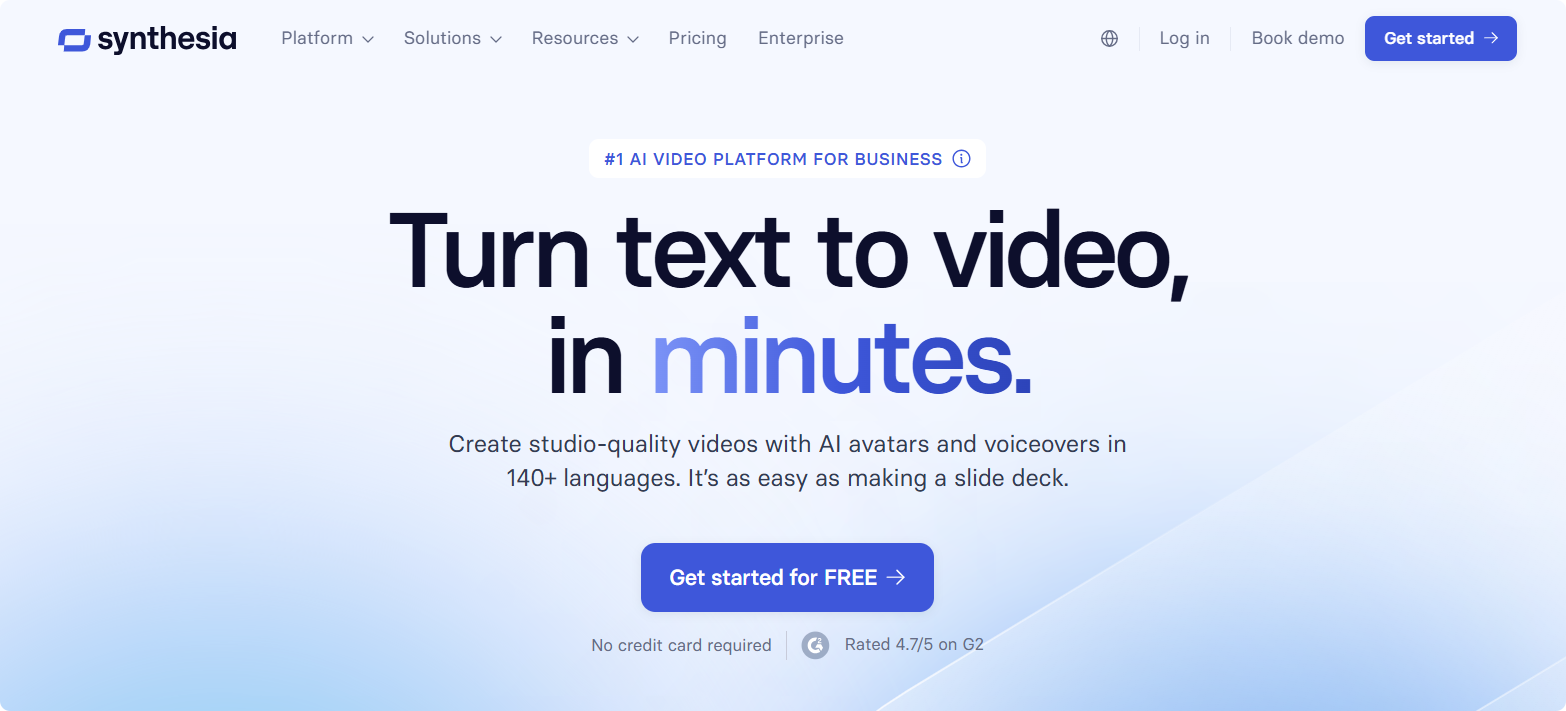
2) Music generation:
▪ Suno (USA): Suno was founded in 2022 by Michael Shulman, Georg Kucsko, Martin Camacho, and Keenan Freyberg. They all previously worked at the AI startup Kensho. Suno is a generative AI music composition program designed to create realistic songs that combine vocals and instruments or purely instrumental pieces. This Cambridge-based startup has raised $125 million from investors such as Lightspeed Venture Partners and Nat Friedman, the CEO of GitHub, and has grown to approximately 12 million users. Valued at $500 million, Suno was integrated with Amazon’s Alexa earlier this year.


4. Other companies worthy of attention:
1) Clay (USA): The founder of Clay, Kareem Amin, has a unique background as a tech entrepreneur: he previously worked in journalism. Before founding Clay, he was part of a $1.3 billion unicorn company that created AI-driven spreadsheets for sales teams. Clay offers AI-powered sales and marketing tools, aiming to build an “action system” that goes beyond traditional “record systems.” It achieves a balance between automation and creativity through configurable building blocks. Clay leverages AI to automate and personalize outreach processes, helping businesses interact with customers more effectively. AI plays a key role in enhancing the personalization and efficiency of sales processes, providing companies with a competitive edge to adapt to market changes. For example, enterprise clients such as OpenAI and Anthropic use Clay to organize sales leads and discover new ones.

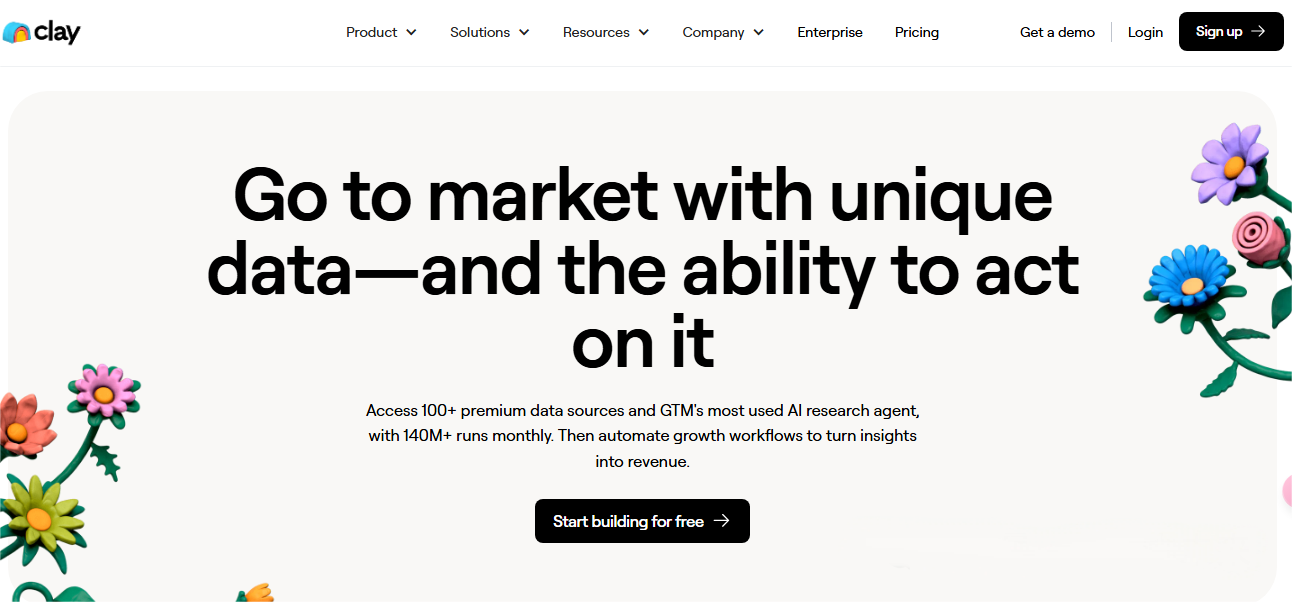
2) Mercor (USA): Mercor was founded by Brendan Foody, Adarsh Hiremath, and Surya Midha in 2023 after they dropped out of college during their sophomore year. Mercor utilizes an AI-driven recruitment platform to evaluate and screen job applicants, identifying outstanding candidates from a large number of cover letters and resumes, and screening them through video calls with virtual avatars.
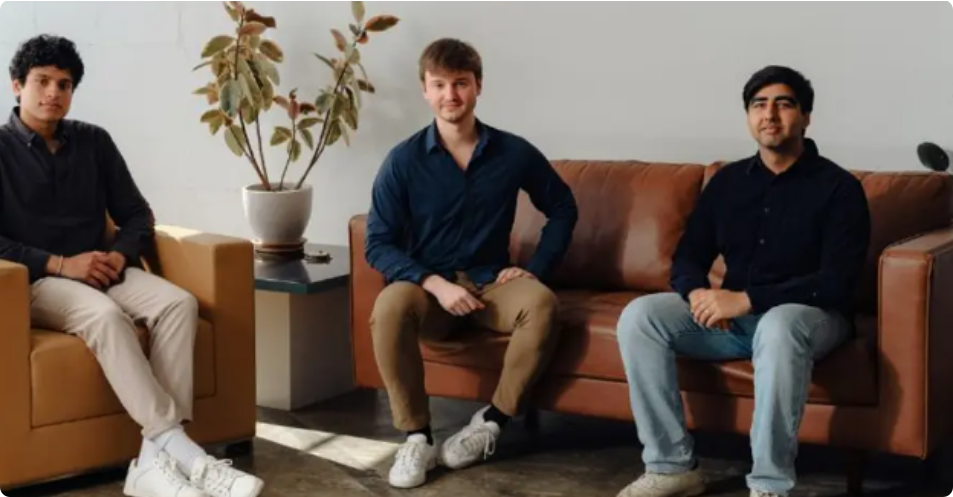
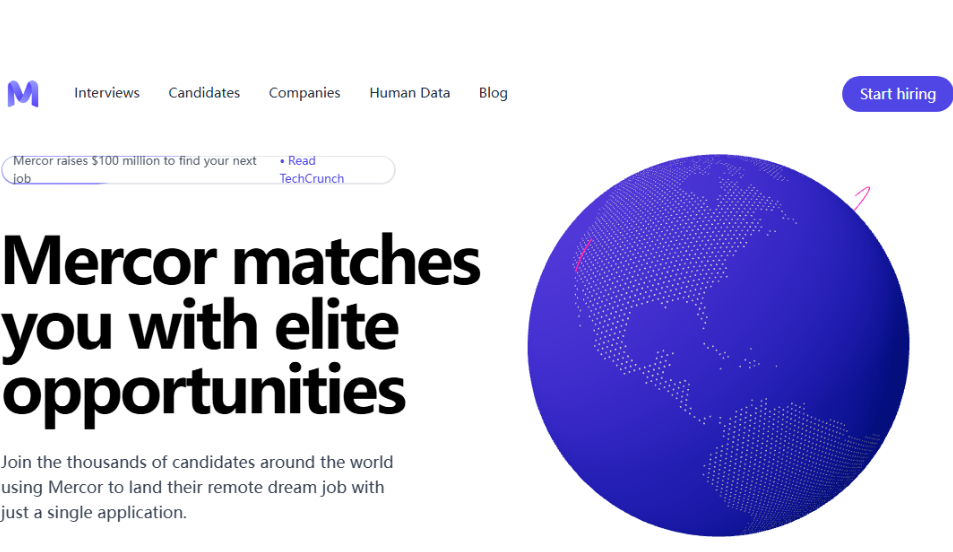
3) DeepL (Germany): Founded in 2017, DeepL is headquartered in Cologne, Germany. The company was established by Dr. Jaroslaw Kutylowski, a Polish entrepreneur and computer scientist. It offers advanced AI translation services, and its AI-powered software enables users to translate text and documents into 30 different languages. With its precision and natural language processing capabilities, DeepL has competed with tech giants like Google and Microsoft as a startup, continuously raising the industry standards for machine translation. It is widely regarded as one of the best translation tools in the world.
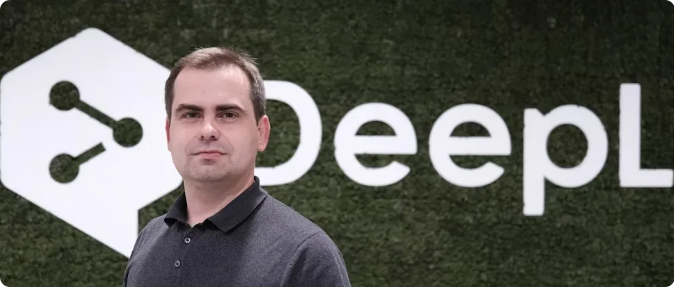
4) ElevenLabs (UK): Founded in 2022, ElevenLabs was co-founded by Piotr Dabkowski, a former Google machine learning engineer, and Mati Staniszewski, a former Palantir strategy analyst and childhood friend. Both were born and raised in Poland and completed their university education in the UK. Mati Staniszewski graduated from Imperial College London and has started two businesses in the past. Piotr Dabkowski earned his undergraduate and master’s degrees from Oxford and Cambridge universities, respectively. ElevenLabs focuses on developing advanced speech synthesis and natural language processing technologies, providing high-quality voice generation services that are widely used in the media and entertainment industries. With ElevenLabs’ software, you can change your voice, clone your voice, or even make yourself sound like you’re speaking a different language. This generative AI audio company offers 45 pre-made voices for podcast dubbing, audiobook narration, and creating voiceovers. The Polish duo made it onto Forbes’ 30 Under 30 Europe list last year and raised $281 million for their company at a valuation of $3.3 billion.

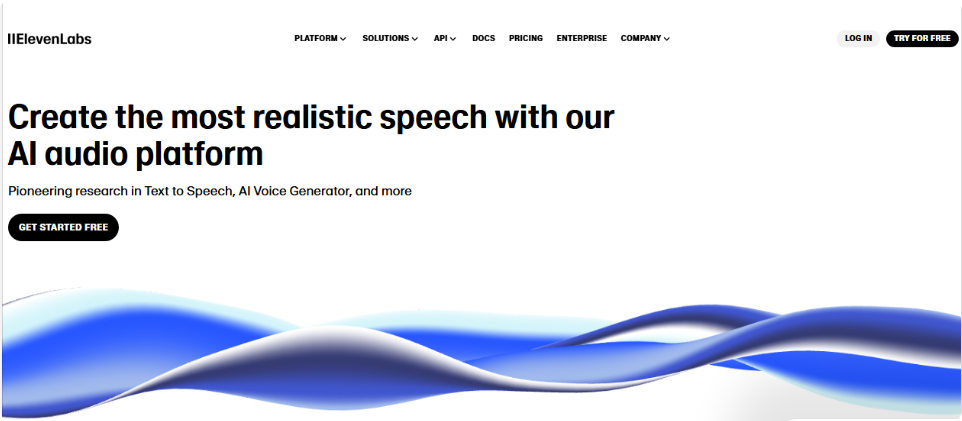
5) Vannevar Labs (USA): Founded in 2019 by Brett Granberg and Nini Hamrick, Brett Granberg previously worked for several years at In-Q-Tel, a non-profit venture capital firm that provides technology for the intelligence community, while Hamrick served as a counter-terrorism officer for seven years. VANNEVAR Labs is dedicated to developing cutting-edge AI and machine learning technologies for defense and intelligence applications, helping government and military agencies enhance data analysis and decision-making capabilities. Today, Vannevar Labs’ artificial intelligence software, Decrypt, has been deployed across global military bases to analyze documents, translate information, and identify patterns in battlefield intelligence. For instance, the U.S. Air Force is using it to analyze technical documents related to Russian air defense systems. In 2023, Vannevar Labs completed a $75 million Series B funding round, reaching a valuation of $1.5 billion.

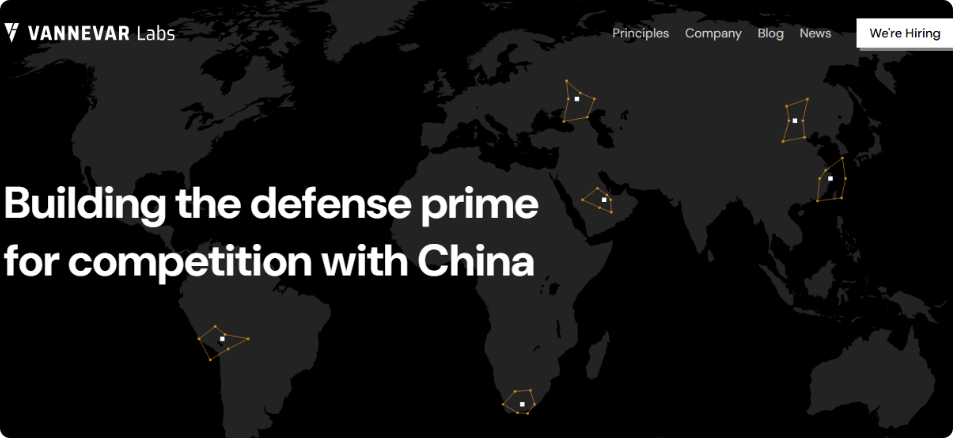
6) World Labs (USA): Founded in 2024 by “AI Goddess” Li Fei-Fei, along with Justin Johnson, Christoph Lassner, and Ben Mildenhall, World Labs is a spatial intelligence AI company dedicated to creating the “Large World Model” (LWM) for the perception, generation, and interaction of 3D worlds. It simulates the laws of motion of objects in three-dimensional space, such as gravity and collision, and applies them in fields like theme parks and flight simulation.
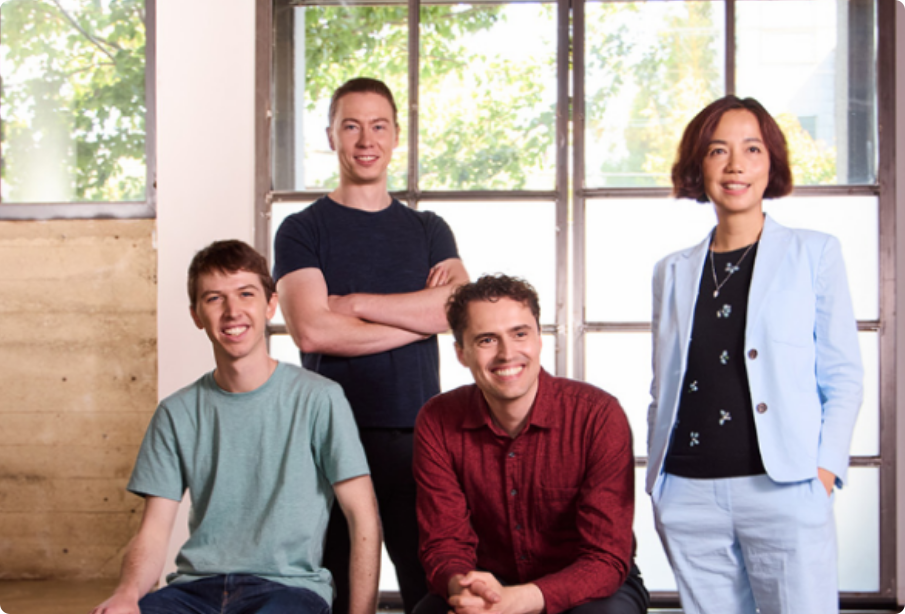

7) Thinking Machine Labs (USA): A mysterious startup founded by former OpenAI CTO Mira Murati, focusing on the research of scientific and programming AI. Although it doesn’t have specific products yet, it has attracted much attention due to its founder and plans to raise $1 billion at a valuation of approximately $90 billion.
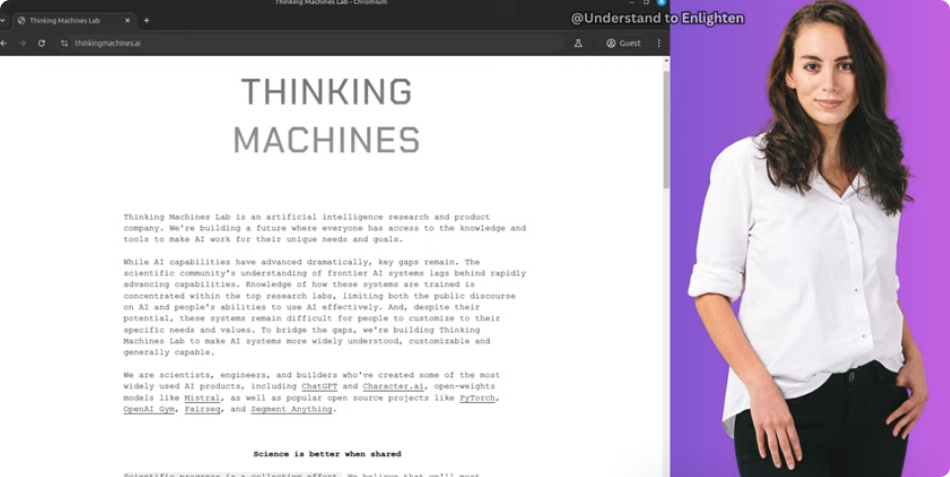
8) VAST Data (USA): Founded by Renen Hallak in 2016, headquartered in New York, it provides data management and infrastructure software to help enterprises manage and store the data required for the continuously growing AI models. After raising $118 million in its Series E funding round, its valuation increased from $3.7 billion in 2021 to over $9 billion by December 2023. Customers such as NASA, Zoom, and Pixar contributed to the $200 million contract signed by this startup at the end of 2023.

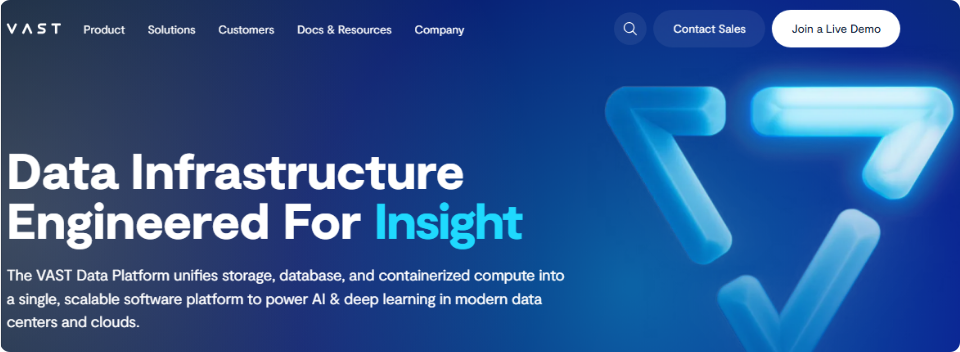
9) SambaNova (USA): SambaNova is one of the many companies vying to build the next generation of AI chips. This 8-year-old startup has to compete not only with traditional players like Nvidia but also with rival startups such as Groq and Cerebras. SambaNova’s advantage lies in its focus on combining software with hardware to develop products specifically focused on AI computing and data processing for companies like Saudi Aramco, SoftBank, and Hugging Face. The company’s co-founders include Stanford University professor Kunle Olukotun, who serves as the Chief Technology Officer, Christopher Ré, and CEO Rodrigo Liang, who previously served as a Senior Vice President at Oracle for a long time. Since its founding in 2017, SambaNova has raised $1.1 billion in funding from backers such as Accel, OpenAI, and Khosla Ventures, with a valuation of $5.1 billion.

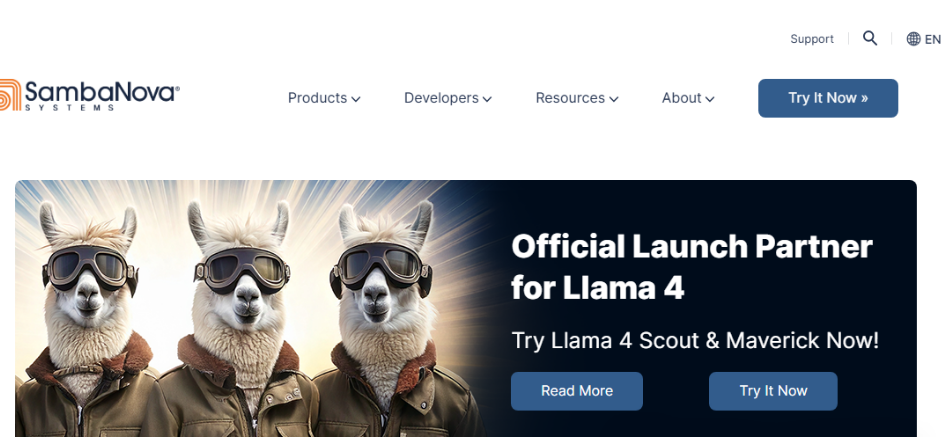
Conclusion:
The “Top 50 Most Promising AIs of 2025” list not only showcases the latest technological breakthroughs and business model innovations in the AI field but also paints a clear blueprint for a future deeply empowered by AI. From automating repetitive workflows to creating entirely new products and services, these companies on the list are accelerating the arrival of the artificial intelligence era with their innovation and execution capabilities.
Despite the fact that there are still numerous challenges on the path of AI development, such as data privacy, algorithmic bias, and potential changes in the employment structure, the vibrant vitality and great potential demonstrated by this list are beyond doubt.
Related Posts

